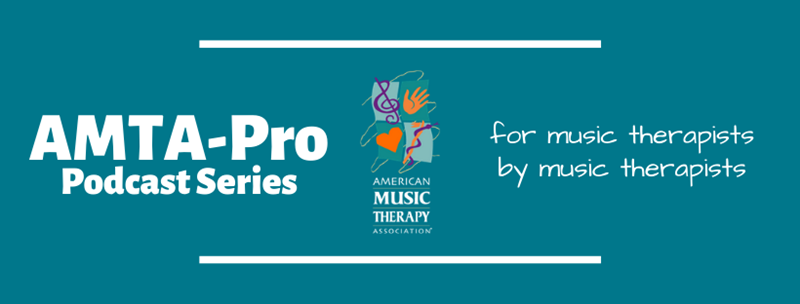
A Benefit of Membership in AMTA
The AMTA-Pro podcast series features your music therapy colleagues, students, and interns as well as other invited guests. This benefit exclusively for AMTA members, began in 2009 and features a interviews on a variety of topics accompanied by a text section including relevant photos and videos, a transcript of the podcast or discussion outline, references, additional resources, and information about the speakers. Take a look at the complete list of topics and descriptions below - a wealth of interesting podcasts - then click on the entry page to listen and/or read along.
Note: AMTA-pro is a benefit of membership in AMTA and normally available only to current AMTA members. However, due to events surrounding the Corona Virus and COVID-19, and in order to serve the music therapy community with additional needed information, we are temporarily making this resource available to AMTA members and non-members alike.
Sponsor an AMTA-Pro Podcast
You are invited to sponsor an AMTA-Pro Podcast. AMTA-Pro podcast sponsor fee is just $500.00. Email for details: amtapro@musictherapy.org or CathyKnoll@gmail.com.
2022 Podcasts:
Dr. Alan Solomon: Jazzy Music Therapist
Alan tells his AMTA-Pro podcast listeners his musical journey started as a result of his living in the same town as the Newport Jazz and Folk Festivals, events which inspired him to take guitar lessons. This opened the door to music experiences as a youngster, teen, and college student which eventually led to his becoming a music therapist. Alan has many stories to tell about his career as a musician, a clinician, and an educator as well as his active life as a retiree teaching online, spending time with families of their three sons, and teaching, composing, and playing acoustic fingerstyle guitar and traditional acoustic blues. The text accompanying this AMTA-Pro podcast includes some interesting photographs as well as a written informal biography in which Alan shares some more delightful stories about his adventures in music and music therapy over the years.
Mary Toombs Rudenberg: Music Therapist Since 1951
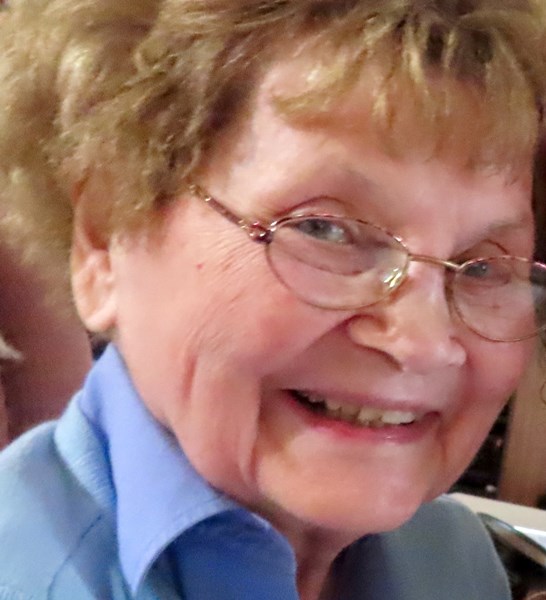 The music therapy gig for Mary Rudenberg started over 70 years ago. Yes, you are reading correctly. Mary began her graduate studies in music therapy with E. Thayer Gaston and William Sears at the University of Kansas in 1951. And she continued encouraging music therapy clinicians right up to her recent passing in 2022. Mary wrote chapters about dance therapy and about geriatric patients in the original Gaston book Music in Therapy published in 1968; she trained over a hundred music therapy interns; and she was an early clinician in medical music therapy at the University of Texas Medical Branch in Galveston, Texas starting in 1966, working at the children’s orthopedic hospital, in inpatient and outpatient pediatric rehabilitation, and with pediatric burn patients at Shriner’s Burns Institute. And that is just the beginning of the story. Tune in to this AMTA-Pro podcast for more about her rather amazing life. p.s. this picture was taken in 2019 when a group of music therapists visited Mary at her home in Galveston one summer day.
The music therapy gig for Mary Rudenberg started over 70 years ago. Yes, you are reading correctly. Mary began her graduate studies in music therapy with E. Thayer Gaston and William Sears at the University of Kansas in 1951. And she continued encouraging music therapy clinicians right up to her recent passing in 2022. Mary wrote chapters about dance therapy and about geriatric patients in the original Gaston book Music in Therapy published in 1968; she trained over a hundred music therapy interns; and she was an early clinician in medical music therapy at the University of Texas Medical Branch in Galveston, Texas starting in 1966, working at the children’s orthopedic hospital, in inpatient and outpatient pediatric rehabilitation, and with pediatric burn patients at Shriner’s Burns Institute. And that is just the beginning of the story. Tune in to this AMTA-Pro podcast for more about her rather amazing life. p.s. this picture was taken in 2019 when a group of music therapists visited Mary at her home in Galveston one summer day.
2021 Podcasts:
Barbara Crowe: Rich History in Music Therapy
As is the case for many music therapists, Barbara Crowe was born into a musical family, played her Scottish grandmother’s 3/4 sized violin in orchestra, and enjoyed singing & playing guitar as did many teens in the 1960’s. While in college she was intrigued at the reaction when she shared music with kids with special needs, so she decided to “invent a new profession.” Then she realized the field of music therapy already existed and appreciated having Bob Unkefer help guide her through a rewarding career from that moment on. In this AMTA-Pro podcast, Barb tells some delightful stories about her music exploits as a youngster, her discovery of music therapy, her eventful professional years, and her interesting adventures as an officer in AMTA in the 1990s.
Linda Bosse: Involvement is the Key
Linda Bosse got a strong start to her music therapy career with her professors Dr. E. Thayer Gaston and Dr. William Sears and her intern supervisors Ken Medema and Sandra Golden. And things have not slowed down in the 50+ years since. In this AMTA-Pro podcast, Linda tells us stories of her education, her clinical work in adult psychiatric and addictions treatment, and her dedicated volunteer work with regional and national music therapy, beginning as a young therapist serving on the NAMT committee that created the current Assembly and Council structures. As Linda tells stories of her professional and volunteer work, she also provides intriguing glimpses into the history of NAMT and AMTA over the past five decades.
Barbara Wheeler: Involvement is the Key
Our music therapy colleague Barbara Wheeler realized early in life that she wanted to share music beyond an elementary school classroom, so she embarked on a music therapy career. In this AMTA-Pro podcast, Barbara tells us of her privilege to cross paths with many people over the years in her work as a clinician, as a college professor in two universities, as an active volunteer in national and world music therapy organizations, as an author and editor of music therapy literature, and as a speaker around the world. The text accompanying this podcast on the AMTA website includes some memorable photos of some of these opportunities. Barbara tells us her connections over the years have helped her understand the broad nature of our field with music therapists around the world working in very different ways. She encourages all of us to get involved with other professionals and to spend some time near the ocean.
Michelle Hairston: Early Connections to Music Therapy
Our MT-BC colleague Michelle Hairston was introduced to music therapy as a toddler. Her dad, Dr. Olin Parker, studied at University of Kansas with Dr. E. Thayer Gaston, the "Father of Music Therapy." During one of his visits to their home, Dr. Gaston asked Michelle about her interests. When the 13-year-old told him she really liked playing in the junior high band and she enjoyed volunteering at a local nursing home. Dr. Gaston took time over the dinner table that evening to tell her about the ins and outs of a career in music therapy, firmly convincing Michelle of her career path. In this AMTA-Pro podcast, Michelle tells us the story of her professional life and of the "of course you can!" encouragement she received from several key figures. You will also want to look at the pictures of Michelle's personal interaction with music therapy pioneers as well as her music therapy clients and students over the decades.
Suzanne Hanser: Music Therapy Insights
As described by our colleague Suzanne Hanser, our music therapy careers allow us to “share our time, creativity, imagination, and compassion with others” while at the same time learning from all we meet. Suzanne has a long and illustrious career as a student, clinician, professor, author, speaker, researcher, and volunteer leader in professional associations. In this AMTA-Pro podcast she shares insights gained during music therapy sessions from several individuals facing challenges in their lives, and she talks about the fulfilling time spent with music therapy colleagues and students she has met over the years.
Robert Groene: A Winding Road to Music Therapy
Our colleague Robert Groene eventually ended up as a professor of Music Therapy at UMKC, but his long and winding musical road all started when he picked out the riff for “Louie Louie” on the piano when his piano teacher preferred he play “Happy Hoptoads” for a recital. In this AMTA-Pro podcast, Robert tells of his adventures as he played in rock bands, got drafted, taught guitar to at-risk adolescents as a Conscientious Objector, started and quit college, then played in more bands and at coffeehouses. All of this before he had even heard of music therapy! Tune in to this AMTA-Pro podcast where Dr. Robert Groene, a recipient of the AMTA Lifetime Achievement Award, tells many anecdotes about his interesting career as a musician and as a music therapist.
Adonia Calhoun Coates: Introducing AMTA's CEO
This AMTA-Pro podcast features a conversation with AMTA’s new Chief Executive Officer, Adonia Calhoun Coates, CAE, CMP. After talking briefly about her previous professional experience, Adonia tells the podcast listeners about her enthusiasm for joining the AMTA team and working with the dedicated community of music therapists. She shares stories about her hearing of the AMTA CEO job opportunity and about her personal long-term connection with music therapy through a family member. Adonia talks about some ideas, immediate projects, and future plans for advancing AMTA’s mission and goals as well as for heightening awareness, increasing collaboration, and a strengthening commitment to expanding the reach of music therapy.
Marilyn Sandness: Music Therapy Visionary
When in 7th grade, our colleague and AMTA Honorary Life Member Marilyn Sandness was recruited to play saxophone in a dance band. With the money made on those gigs, she purchased more instruments and lessons, embarking on a long, illustrious career in music and music therapy. In this AMTA-Pro podcast, Marilyn shares engaging stories about her professional journey including her college studies beginning with a degree from Eastman in 1958, her clinical work in some challenging situations in the early 1960s and through major transformation in the nature of services in the 1970s, her twenty-four rewarding years as a music therapy professor, and her thirty-four intense years as a volunteer with NAMT and AMTA, helping shape the nature of education and training music therapists today.
Federal Advocacy for Music Therapy
In this AMTA-Pro podcast, AMTA’s Government Relations Director Judy Simpson and AMTA’s Senior Federal Policy and Programs Analyst Rebecca Preddie overview the extensive work of AMTA’s Government Relations team on behalf of the profession of music therapy and the people music therapists serve. This discussion provides the information and contacts music therapists need to get involved in helping raise the impact and efficacy of music therapy services and to increase access to music therapy in the areas of health, education, veteran services, and the health care work force. The AMTA-Pro podcast notes provide a wealth of advocacy resources for music therapists.
2020 Podcasts:
Music Therapy Advocacy: Make a Real Impact
In reality, a music therapist's daily work is the strongest advocacy tool for spreading the word about music therapy. At the same time, every MT-BC can more purposefully contribute to the critical task of increasing the strength and frequency of advocacy efforts for our profession in keeping with the mission of AMTA - "to advance public awareness of the benefits of music therapy and increase access to quality music therapy services in a rapidly changing world." In this AMTA-Pro podcast, our colleague Leslie Henry, co-chair of AMTA's Professional Advocacy Committee, shares a wealth of helpful advocacy guidelines based on her own experiences as well as some years of working with MT-BCs around the country. Leslie leads listeners through an exploration of their own networks and how to tend these networks, approaches that can be used based on the timing of the idea you are advocating for, and time-tested tips on being persuasive in different situations. The text notes for this AMTA-Pro podcast include valuable guidelines and resources.
Resiliency & Staff Care Program Model
Because MT-BCs respond to unit needs throughout the hospital system, Houston Methodist recognizes music therapy as an opportunity to provide opportunities for self-care, wellness support, and resilience training for the staff. In this AMTA-Pro podcast, three of our music therapy colleagues, Jennifer Townsend, Virginia Gray, and Audrey Zybura, share details about their program that provides both wellness support and staff care for their fellow healthcare professionals at Houston Methodist. They talk about various aspects of the programs, including boundaries, collaboration, costs, and specific unit needs, and the music therapy team shares a number of creativity-focused and education-focused opportunities that have proven helpful to the hospital staff. The music therapists also discuss points music therapists would want to consider when establishing a resiliency and staff care program. The podcast notes include details about their program and an outline for establishing similar support in other agencies.
Music Industry Issues for Music Therapists
Why should music therapists be concerned with music industry issues? How are songwriters compensated for their work? What are fair use principles? How do fair use, copyrights, streaming, and other music industry issues impact music therapy? In this AMTA-Pro podcast, Dr. Tracy Richardson shares her knowledge and insights about these issues based on extensive personal experience in both music therapy and the music industry. In addition to being a serious singer/songwriter who has opened for major artists and has 3 original CDs to her credit, Tracy has over 30 years of experience as a music therapy clinician and educator. Her podcast provides some food for thought and helpful resources for all music therapists.
Self Care Toolbox for Music Therapy Students
Stress and anxiety impact music therapy students daily. Not only freshmen, but also upperclass and graduate students often struggle with schedules, new surroundings, finances, grades, expectations by self and others, over commitment, and other pressures. In this AMTA-Pro podcast, Dr. Jennifer Fiore shares her work with music therapy students in learning to recognize the need for self-care and to develop their own self-care toolbox with personalized strategies addressing their unique situation and needs. Dr. Fiore provides many helpful tips and resources for music therapy professors and music therapy students, including suggestions for coping with particular stresses related to COVID-19.
Music Therapy & Speaking Voice in Parkinson's Disease
Speaking voice is an area of concern for many individuals with Parkinson’s Disease since being able to communicate makes a real difference in our daily quality of life. People with Parkinson’s Disease often experience softer voices and find it harder to talk to others, potentially leading to self-isolation and to lose of desire to attempt communicating with people around them. In this AMTA-Pro podcast, our MT-BC colleague Sarah Swann Solberg discusses some of these issues and overviews her research about the impact of music therapy interventions on improving the speaking voice of individuals with Parkinson’s Disease. Sarah recommends continued research because of the potential significance on the quality of lives of over 10 million people worldwide currently diagnosed with Parkinson's Disease.
Innovations in Military Music Therapy
Since 2014, board certified music therapists have provided services to active duty service members and veterans with traumatic brain injury (TBI) and post-traumatic stress (PTSD) in military medical facilities across the United States through Creative Forces®: NEA Military Healing Arts Network. In this AMTA-Pro podcast, speakers Sara Kass, Rebecca Vaudreuil, Donna Betts, and Danielle Kalseth describe music therapy practice and research as well as effective and innovative interventions. They also share stories illustrating ways in which Creative Forces supports clinic-to-community programming to further support healing, motivate recovery, and promote reintegration, making a marked impact in the lives of individuals and their families. The text notes of this AMTA-Pro podcast include links to a number of related resources and intriguing media links.
Music Therapy in Forensic Psychiatric Setting
Music therapists Tara Brinkman and Steven Franco work at Department of State Hospitals - Atascadero, a maximum security forensic hospital. Some of the patients are awaiting court proceedings and some were determined not guilty by reason of insanity, but a large portion of the population has been convicted of violent felonies. Both therapists work with various groups and individuals in the forensic hospital, but in this podcast they talk about a centralized group called REACH-Music. Tara and Steven overview the structure of the REACH-Music group and some of the research behind their work with these clients. They describe numerous music therapy interventions which address goal areas such as emotional intelligence, mental health management, grounding, and social skills. This AMTA-Pro podcast also includes information about the importance of building a therapeutic alliance and other safety tips.
Group Music Therapy in Pediatric Medical Setting
Children admitted to a hospital are asked to live in an unfamiliar place, to put their trust in strangers, to commit to irregular schedules, and to endure frequent medical tests, check-ups, and procedures. Hospitals are unique settings where music therapy groups give kids a chance to enjoy making music, to cope with change, to boost environmental control, to broaden social networks, to express concerns and emotions, and to build resiliency. In this AMTA-Pro podcast, four MT-BCs at the Children’s Minnesota Hospitals – the 7th largest pediatric health system in US – talk about their music therapy groups for medical/surgical patients, for hematology/oncology patients, and for patents with diabetes, eating disorders, and other issues. Our colleagues Erinn Frees, Alicia Little, Sarah Woolever, and Kayla Shafer talk about their work – along with the other MT-BCs and MT interns at Children’s MN – facilitating groups for all ages including focus groups for tweens, teens, parents, siblings, and even staff. The text section of this AMTA-Pro podcast includes a wealth of resources, references, and other information about successfully including group music therapy alongside individual therapy in the pediatric medical setting.
About the World Federation of Music Therapy
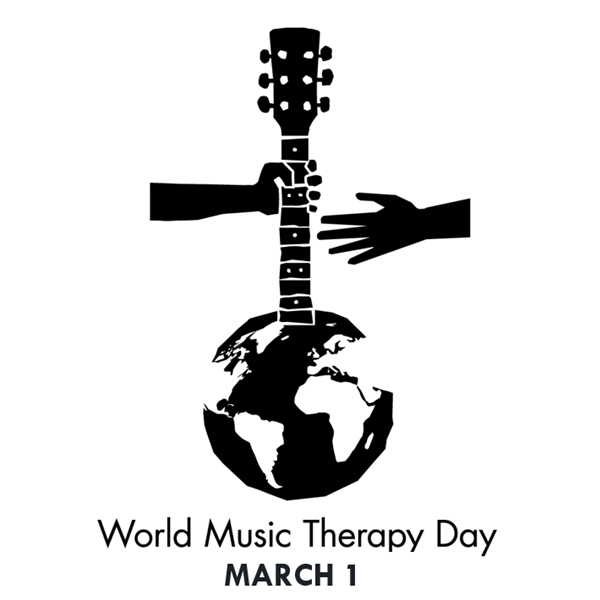 The World Federation of Music Therapy (WFMT) is dedicated to developing and promoting music therapy throughout the world as an art and science. The Federation supports a global music therapy network for exchanging and disseminating information about educational programs, clinical practice, and research in all parts of the world. The speakers in the AMTA-Pro podcast – Anita Swanson, Daniel Tague, and Andi McGraw Hunt – talk about ways in which professionals and students can collaborate with peers in other countries. They also tell us about some of the current WFMT initiatives such as contributions to research, plans for the upcoming 2020 World Congress of Music Therapy, and ways to participate in the annual March 1st World Music Therapy Day. The info page for this podcast includes photos, resources, and more information about the World Federation of Music Therapy.
The World Federation of Music Therapy (WFMT) is dedicated to developing and promoting music therapy throughout the world as an art and science. The Federation supports a global music therapy network for exchanging and disseminating information about educational programs, clinical practice, and research in all parts of the world. The speakers in the AMTA-Pro podcast – Anita Swanson, Daniel Tague, and Andi McGraw Hunt – talk about ways in which professionals and students can collaborate with peers in other countries. They also tell us about some of the current WFMT initiatives such as contributions to research, plans for the upcoming 2020 World Congress of Music Therapy, and ways to participate in the annual March 1st World Music Therapy Day. The info page for this podcast includes photos, resources, and more information about the World Federation of Music Therapy.
Leadership for Students and New MT-BCs
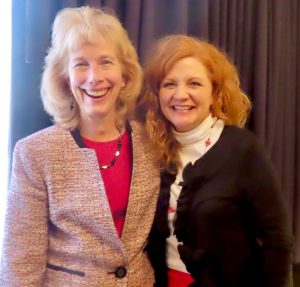 Are you a leader? Many students and newly board certified music therapists might hesitate to dive into a professional leadership role early in their career. In this podcast, two experienced music therapists who have served AMTA in a wide variety of capacities take some time during a very busy national music therapy conference to sit in front of the AMTA-Pro microphone to share their thoughts about the value of beginning early in a career path when considering leadership opportunities. Podcast speakers Amber Weldon-Stephens and Jean Nemeth not only encourage all music therapists to become involved in their local, state, regional, and national music therapy organizations, but the two experienced professionals also provide numerous specific, practical tips for making a journey into leadership rewarding and enriching.
Are you a leader? Many students and newly board certified music therapists might hesitate to dive into a professional leadership role early in their career. In this podcast, two experienced music therapists who have served AMTA in a wide variety of capacities take some time during a very busy national music therapy conference to sit in front of the AMTA-Pro microphone to share their thoughts about the value of beginning early in a career path when considering leadership opportunities. Podcast speakers Amber Weldon-Stephens and Jean Nemeth not only encourage all music therapists to become involved in their local, state, regional, and national music therapy organizations, but the two experienced professionals also provide numerous specific, practical tips for making a journey into leadership rewarding and enriching.
2019 Podcasts:
Intro to the 2019 AMTA Code of Ethics
AMTA adopted a new Code of Ethics February 1, 2019.This AMTA-Pro podcast features members of the AMTA Ethics Board providing an overview of the Code of Ethics which is an aspirational model similar to that adopted by many allied health professions. Learn about this aspirational approach and how it asks each professional and student to take more responsibility for monitoring personal conduct and decisions while holding the best interests of the client at the forefront of the decision-making process.
Substance Abuse and Music Therapy
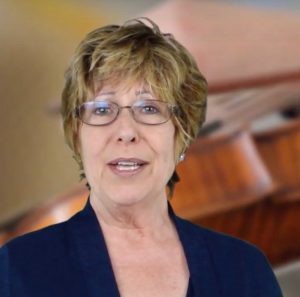 More than 14,500 treatment facilities focus on substance abuse populations in the United States. According to the Centers for Disease Control’s National Syndromic Surveillance Program, opioid overdoses alone rose 30% in the United States from July 2016 through September 2017. In this AMTA-Pro podcast, our music therapy colleague Judith Pinkerton talks about her work providing music therapy service each week for over 150 adult patients diagnosed with Substance Abuse Disorders in three residential facilities of the American Addiction Centers in Las Vegas, Nevada. She shares information about dynamic, innovative music therapy services designed to meet the needs of patients, clinical staff, and administration, and she talks about session planning, treatment and prevention strategies, and self-care for the music therapist.
More than 14,500 treatment facilities focus on substance abuse populations in the United States. According to the Centers for Disease Control’s National Syndromic Surveillance Program, opioid overdoses alone rose 30% in the United States from July 2016 through September 2017. In this AMTA-Pro podcast, our music therapy colleague Judith Pinkerton talks about her work providing music therapy service each week for over 150 adult patients diagnosed with Substance Abuse Disorders in three residential facilities of the American Addiction Centers in Las Vegas, Nevada. She shares information about dynamic, innovative music therapy services designed to meet the needs of patients, clinical staff, and administration, and she talks about session planning, treatment and prevention strategies, and self-care for the music therapist.
Creating a Music Therapy Intervention Strategy
This AMTA-Pro podcast captures an interesting conversation with our music therapy colleagues Kimberly Sena Moore and Deanna Hanson-Abromeit as they talk through the various steps involved when creating a viable music therapy intervention strategy. They emphasize how collaboration and forward thinking are necessary when systematically looking at the theoretical framework of a music intervention and the therapeutic function of the music when studying the feasibility and fidelity of the proposed music intervention. The clinical trials provide critical information about the efficacy of the intervention with clinical populations and provide input about replication and generalization. The text section of this AMTA-Pro podcast includes a wealth of resources as well as information about the Musical Contour Regulation Facilitation (MCRF), a music intervention designed to promote emotion regulation in at-risk preschoolers. Kimberly and Deanna use their work in creating the MCRF as an example of the intervention development process.
Growing Your Private Music Therapy Practice
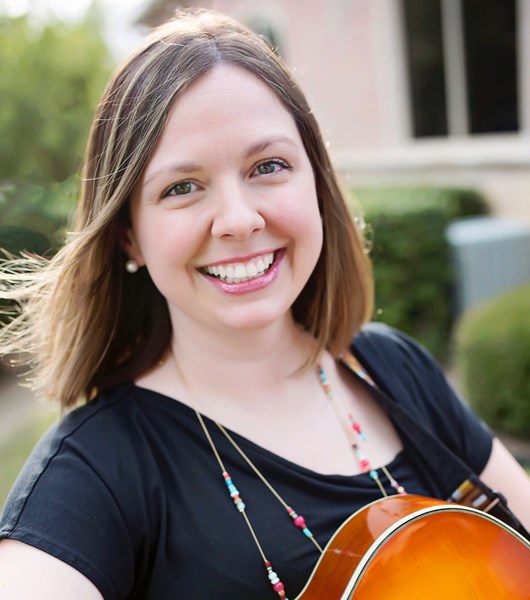
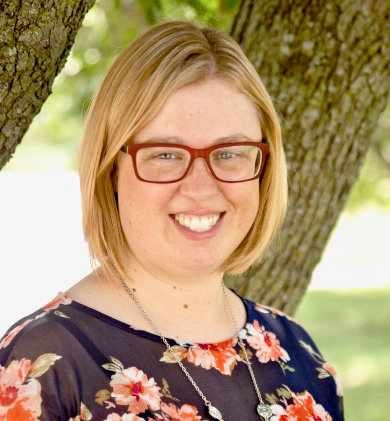 The speakers in this AMTA-Pro podcast are speaking from first-hand experience when talking about their ups and downs when establishing their own successful and expanding music therapy practices. Our MT-BC colleagues Mary Altom and Rachelle Morgan share a wealth of effective strategies for growing a private music therapy practice without fear. The discussion focuses on different approaches for selling music therapy services, and includes practical information about word-of-mouth marketing, content marketing, advertising, and event-based marketing. Rachelle and Mary spend some time in the podcast talking about a useful 4-part consultation model, and they provide some helpful resources for anyone wanting to start or grow a music therapy practice.
The speakers in this AMTA-Pro podcast are speaking from first-hand experience when talking about their ups and downs when establishing their own successful and expanding music therapy practices. Our MT-BC colleagues Mary Altom and Rachelle Morgan share a wealth of effective strategies for growing a private music therapy practice without fear. The discussion focuses on different approaches for selling music therapy services, and includes practical information about word-of-mouth marketing, content marketing, advertising, and event-based marketing. Rachelle and Mary spend some time in the podcast talking about a useful 4-part consultation model, and they provide some helpful resources for anyone wanting to start or grow a music therapy practice.
CBMT: Critical Services for Music Therapists
Board Certified Music Therapist Joy Schneck worked in pediatric oncology and as a Clinical Training Director until 1985 when she took the position of Director of Professional Programs for NAMT (now called AMTA). She began working as Executive Director of the Certification Board for Music Therapists (CBMT) in 1993 and has provided leadership in music therapy credentialing since that time. In a recent blog post for the Institute for Credentialing Excellence online journal, Joy said that CBMT's mission and purpose were important to her personally because, by "working clinically as a music therapist and knowing the struggles therapists faced, I recognized the need for an objective measure of competence to solidify our professional goals in the health care arena." Her dedication to that critical aspect of board certification shaped her work for NAMT starting in 1985 and then for CBMT since 1993. Joy talks informally in this AMTA-Pro podcast about her work as a clinician and her thoughts about the early years of developing professional certification and provides numerous helpful resources in the text section of this podcast.
Addressing Sexual Harassment in the Workplace
As music therapists, we often find ourselves networking with most staff members and with numerous groups and individuals within our facilities. This unique work culture sometimes results in challenging or inappropriate comments or advances from others. In this AMTA-Pro podcast, music therapist Kory Antonacci discusses different types of sexual harassment and provides specific guidelines and resources for music therapy professionals, interns, and students to utilize when responding to, reporting, and taking steps to prevent sexual harassment. We can use these tools to create a safe workplace culture for all involved.
Music Therapy in Intergenerational Rock Band

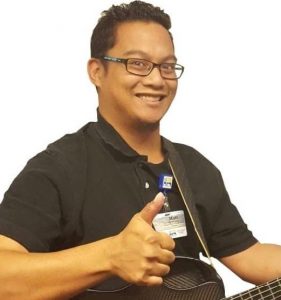 The benefits for all participants are evident when older adult community members and college students gather weekly under the leadership of a music therapist to learn and enjoy music popular across all generations. In this AMTA-Pro podcast, our music therapy colleagues Natalie Wlodarczyk and Matt Valois provide pragmatic guidelines for intergenerational rock band experiences designed to facilitate maintenance of cognitive, psychosocial, and physical skills for older adults while introducing both generations to new music and new experiences. Natalie and Matt discuss field-tested methods for selecting, arranging, and teaching pop music from diverse artists over the decades, and they share ideas for customizing intergenerational music experiences to respond to individual and group needs while promoting wellness, group cohesion, and bonding between the two generations.
The benefits for all participants are evident when older adult community members and college students gather weekly under the leadership of a music therapist to learn and enjoy music popular across all generations. In this AMTA-Pro podcast, our music therapy colleagues Natalie Wlodarczyk and Matt Valois provide pragmatic guidelines for intergenerational rock band experiences designed to facilitate maintenance of cognitive, psychosocial, and physical skills for older adults while introducing both generations to new music and new experiences. Natalie and Matt discuss field-tested methods for selecting, arranging, and teaching pop music from diverse artists over the decades, and they share ideas for customizing intergenerational music experiences to respond to individual and group needs while promoting wellness, group cohesion, and bonding between the two generations.
Publication Ethics for Authors and Editors
 It seems the ethics of publishing an article would be rather straightforward, but this AMTA-Pro podcast reveals the complexity of publication. The podcast features an informative and thought-provoking conversation with Sheri Robb, Helen Shoemark, and Barbara Else talking about some key questions: What constitutes authorship? What is token authorship? Is it plagiarism if…? What is self-plagiarism? What should students and mentors consider with regard to authorship? What is meant by fragmented publication? What about intellectual property and copyright? The text section of the podcast includes helpful resources.It seems the ethics of publishing an article would be rather straightforward, but this AMTA-Pro podcast reveals the complexity of publication. The podcast features an informative and thought-provoking conversation with Sheri Robb, Helen Shoemark, and Barbara Else talking about some key questions: What constitutes authorship? What is token authorship? Is it plagiarism if…? What is self-plagiarism? What should students and mentors consider with regard to authorship? What is meant by fragmented publication? What about intellectual property and copyright? The text section of the podcast includes helpful resources.
It seems the ethics of publishing an article would be rather straightforward, but this AMTA-Pro podcast reveals the complexity of publication. The podcast features an informative and thought-provoking conversation with Sheri Robb, Helen Shoemark, and Barbara Else talking about some key questions: What constitutes authorship? What is token authorship? Is it plagiarism if…? What is self-plagiarism? What should students and mentors consider with regard to authorship? What is meant by fragmented publication? What about intellectual property and copyright? The text section of the podcast includes helpful resources.It seems the ethics of publishing an article would be rather straightforward, but this AMTA-Pro podcast reveals the complexity of publication. The podcast features an informative and thought-provoking conversation with Sheri Robb, Helen Shoemark, and Barbara Else talking about some key questions: What constitutes authorship? What is token authorship? Is it plagiarism if…? What is self-plagiarism? What should students and mentors consider with regard to authorship? What is meant by fragmented publication? What about intellectual property and copyright? The text section of the podcast includes helpful resources.
Getting Your Research Published
 Submitting a research manuscript to a peer-reviewed journal can be a daunting, mysterious endeavor. The speaker in this AMTA-Pro podcast, Dr. Shannon de l’Etoile, provides a step-by-step explanation of the peer review process to help increase the likelihood of favorable reviews Prospective authors will learn how to select an appropriate journal for submission and how to apply general author guidelines relevant to most peer-reviewed journals. Podcast listeners will also learn about the mechanics of scientific writing and gain insight into the expectations of reviewers in peer-reviewed journals for manuscript content; including scientific rigor, appropriate analysis and presentation of data, and meaningful interpretation of findings.
Submitting a research manuscript to a peer-reviewed journal can be a daunting, mysterious endeavor. The speaker in this AMTA-Pro podcast, Dr. Shannon de l’Etoile, provides a step-by-step explanation of the peer review process to help increase the likelihood of favorable reviews Prospective authors will learn how to select an appropriate journal for submission and how to apply general author guidelines relevant to most peer-reviewed journals. Podcast listeners will also learn about the mechanics of scientific writing and gain insight into the expectations of reviewers in peer-reviewed journals for manuscript content; including scientific rigor, appropriate analysis and presentation of data, and meaningful interpretation of findings.
A Quick Reference Guide for Lyric Analysis
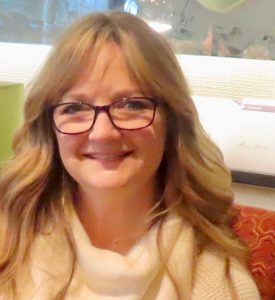 Lyric analysis is used in psychosocial music therapy treatment to assist music therapy clients in identifying personal issues, exploring emotions, and relating to the experiences of others. In this AMTA-Pro podcast, our colleague Karen Miller presents a Quick Reference Guide to Lyric Analysis for music therapy clinicians. The clinical tool, built on a solid foundation of theory, research, and practice, is an easily accessible system for clinical decision-making. It is also intended to assist therapists and their clients in moving from the identification and expression of therapeutic material to positive action, thereby facilitating practical steps toward problem solving. The Quick Reference Guide is included in the text section of this AMTA-Pro podcast.
Lyric analysis is used in psychosocial music therapy treatment to assist music therapy clients in identifying personal issues, exploring emotions, and relating to the experiences of others. In this AMTA-Pro podcast, our colleague Karen Miller presents a Quick Reference Guide to Lyric Analysis for music therapy clinicians. The clinical tool, built on a solid foundation of theory, research, and practice, is an easily accessible system for clinical decision-making. It is also intended to assist therapists and their clients in moving from the identification and expression of therapeutic material to positive action, thereby facilitating practical steps toward problem solving. The Quick Reference Guide is included in the text section of this AMTA-Pro podcast.
Collaboration in Clinical Practice and Research
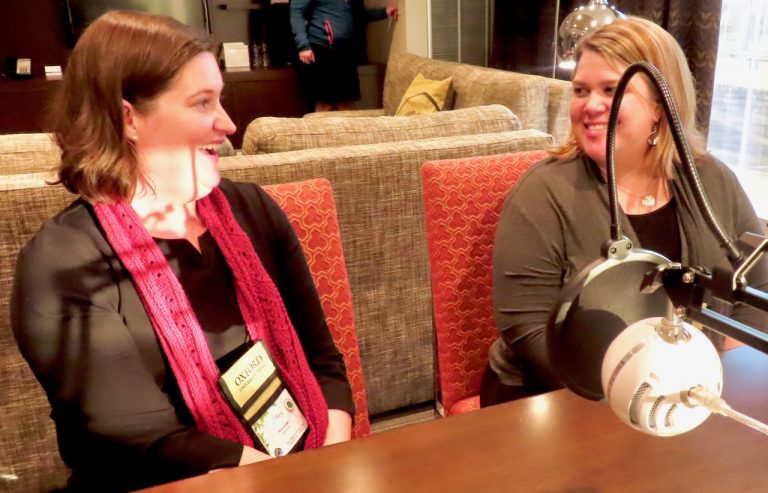 Collaboration can be a key element for music therapists whether in the clinic, in research, or in education and training. In this AMTA-Pro podcast, our music therapy colleagues Dr. Laura Brown and Dr. Ellary Draper share their insights and experiences in several different aspects of their professional careers. Laura and Ellary give examples of ways collaboration and partnerships helped them in their graduate education, in their research projects, in their work as professors, and in two innovative clinical projects. Laura talks about partnering music therapy and speech-language pathology students in Camp Rock, her inclusive camp for children with ASD. Ellary describes her High School Pop Choirs, collaborative projects to help teachers successfully include students with disabilities in general music classrooms. The podcast speakers take time to discuss the benefits of collaborative partnerships as well as some of the challenges they have encountered over the years.
Collaboration can be a key element for music therapists whether in the clinic, in research, or in education and training. In this AMTA-Pro podcast, our music therapy colleagues Dr. Laura Brown and Dr. Ellary Draper share their insights and experiences in several different aspects of their professional careers. Laura and Ellary give examples of ways collaboration and partnerships helped them in their graduate education, in their research projects, in their work as professors, and in two innovative clinical projects. Laura talks about partnering music therapy and speech-language pathology students in Camp Rock, her inclusive camp for children with ASD. Ellary describes her High School Pop Choirs, collaborative projects to help teachers successfully include students with disabilities in general music classrooms. The podcast speakers take time to discuss the benefits of collaborative partnerships as well as some of the challenges they have encountered over the years.
Music Therapy Respite for Families with Dementia
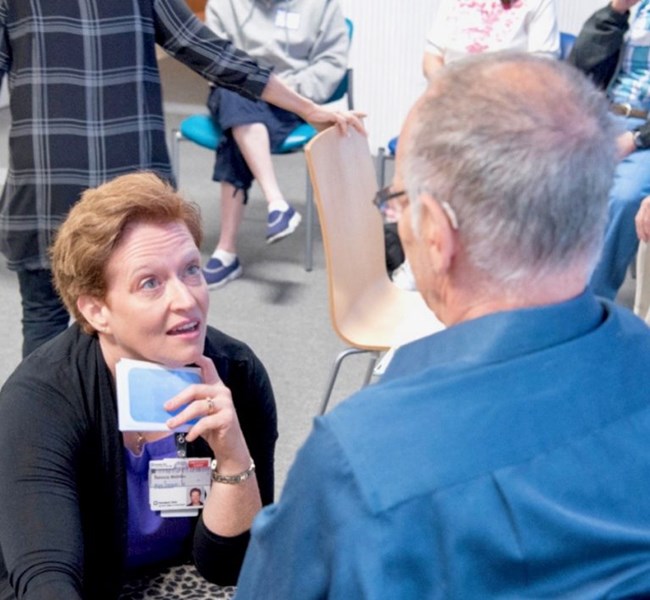 Every life deserves world class care. Our music therapy colleague Dr. Becky Wellman is part of that mission at the Cleveland Clinic Lou Ruvo Center for Brain Health in Nevada where she has developed innovative services providing music therapy for individuals with dementia while at the same time allowing respite time for their family members. In this AMTA-Pro podcast, Becky talks about all aspects of designing and implementing the Music Therapy Respite Program, including assessments, session format, adaptations, safety issues, and more. She also talks about the challenges of building trust with the patients, the staff, and the family members. The results of the survey as well as observations by the therapist and caregiver comments indicate the wide-spread positive impact of the program on all involved.
Every life deserves world class care. Our music therapy colleague Dr. Becky Wellman is part of that mission at the Cleveland Clinic Lou Ruvo Center for Brain Health in Nevada where she has developed innovative services providing music therapy for individuals with dementia while at the same time allowing respite time for their family members. In this AMTA-Pro podcast, Becky talks about all aspects of designing and implementing the Music Therapy Respite Program, including assessments, session format, adaptations, safety issues, and more. She also talks about the challenges of building trust with the patients, the staff, and the family members. The results of the survey as well as observations by the therapist and caregiver comments indicate the wide-spread positive impact of the program on all involved.
Tips for Submitting Strong Conference Proposals
 Proposals for conference sessions or CMTE sessions at regional or national music therapy conferences go through a blind review process, so everyone starts out on an equal footing. But some proposals are more likely to be chosen than others for specific reasons. In this AMTA-Pro podcast, regional representatives on AMTA's Continuing Education Committee share numerous practical tips for developing and submitting strong proposals. The podcast speakers discuss considerations when selecting a topic and when writing the title, abstract, learning objectives, and description of a conference session. All music therapists are encouraged to consider sharing their experiences and expertise in a conference session or CMTE session, and this AMTA-Pro podcast gives a strong start to the process whether you are a seasoned pro or just now getting up the courage to write a conference proposal.
Proposals for conference sessions or CMTE sessions at regional or national music therapy conferences go through a blind review process, so everyone starts out on an equal footing. But some proposals are more likely to be chosen than others for specific reasons. In this AMTA-Pro podcast, regional representatives on AMTA's Continuing Education Committee share numerous practical tips for developing and submitting strong proposals. The podcast speakers discuss considerations when selecting a topic and when writing the title, abstract, learning objectives, and description of a conference session. All music therapists are encouraged to consider sharing their experiences and expertise in a conference session or CMTE session, and this AMTA-Pro podcast gives a strong start to the process whether you are a seasoned pro or just now getting up the courage to write a conference proposal.
Fascinating Music Therapy Pioneers
Three professional musicians led prestigious careers for decades in Europe as opera singers, composers and teachers before moving the United Sates under life-threatening circumstances in WWII. One was a neighbor to Brahms, one worked with Mahler, and another was a singing porter on the London railway for 15 years. After escaping the Gestapo and coming the the United States, all three continued their productive music careers, and all three were among the first recipients of degrees in music therapy. They lived in different parts of the United States and pioneered music therapy practice with a variety of client populations. You won't want to miss this riveting AMTA-Pro podcast where our MT-BC colleague Dr. Ted Ficken tells of their multi-faceted careers in composition, performance, teaching, writing, and music therapy, and about the impact of their work on the lives of many in the early 20th century.
2018 Podcasts:
Music and Harm: What We Know and What We Need to Know
Have you ever heard music therapy described as “non-invasive”, “non-threatening”, or as a treatment with no side effects? In this AMTA-Pro podcast, our music therapy colleagues Brea Murakami and Daniel Goldschmidt discuss the topic of the potential for harm in music therapy, recognizing it has implications for music therapists in clinical, advocacy, educational training, and research realms. Although the AMTA and CBMT Scope of Practice acknowledge the potential for harm within music therapy practice, definitions of harm and ways of conceptualizing harm are few and far between in music therapy literature. After recognizing the need to acknowledge the potential harm, the podcast speakers talk about the need to understand, monitor, address, and prevent harm. They introduce the Music Therapy and Harm Model (MTHM), which provides a way of conceptualizing sources of harm in a music therapy session, and they discuss the possibilities for more specific research, education, and training about the topic of potential harm in music therapy sessions.
Neuroscience Considerations for Addressing Cognitive Skills in Children with Autism Spectrum Disorder
Children on the autism spectrum often have cognitive needs that can be addressed in music therapy. In this AMTA-Pro podcast, Dr. Blythe LaGasse presents current neuroscience research related to individuals on the autism spectrum. She also provides the music therapy clinician with some explanations and clinical ideas for addressing working memory, attention, and executive functioning in children on the autism spectrum.
Guide to Clinical Music Therapy Research
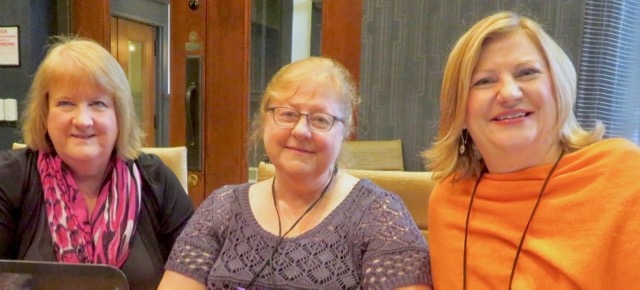 In this AMTA-Pro podcast, speakers Dr. Annie Heiderscheit, Dr. Nancy Jackson, and Dr. Kathy Murphy review the steps necessary for creating a preliminary plan for a clinical research study, including, among other things, (1) exploring clinical interests and looking at different perspectives, (2) determining feasibility, partnerships, collaborators, funding, and logistics of a clinical research project, (3) conducting the literature review, and (4) choosing the appropriate research design for the research question. Based on their own rich experiences in clinical work and in research, the podcast speakers provide examples and insight into navigating the challenges of conducting clinical-based research as well as strategies for overcoming these challenges. In this overview of an interactive session presented at the 2017 AMTA conference, the AMTA-Pro podcast speakers provide the groundwork for podcast listeners to begin the process of planning their own clinical research study.
In this AMTA-Pro podcast, speakers Dr. Annie Heiderscheit, Dr. Nancy Jackson, and Dr. Kathy Murphy review the steps necessary for creating a preliminary plan for a clinical research study, including, among other things, (1) exploring clinical interests and looking at different perspectives, (2) determining feasibility, partnerships, collaborators, funding, and logistics of a clinical research project, (3) conducting the literature review, and (4) choosing the appropriate research design for the research question. Based on their own rich experiences in clinical work and in research, the podcast speakers provide examples and insight into navigating the challenges of conducting clinical-based research as well as strategies for overcoming these challenges. In this overview of an interactive session presented at the 2017 AMTA conference, the AMTA-Pro podcast speakers provide the groundwork for podcast listeners to begin the process of planning their own clinical research study.
Preventive Models of Music Therapy for Children in Limited Resource Communities
Individuals and families in limited-resource communities face real challenges not only in finances but also in opportunities. Insecurity and stress resulting from limitations in food, shelter, health, safety, and other basic needs impact all aspects of a person's well-being. In this AMTA-Pro podcast, two of our music therapy colleagues, Elizabeth K Schwartz and Dr.Varvara Pasiali, discuss these complex challenges and ways in which music therapists can focus on helping children move away from stress, insecurity, and dysfunction toward trust, belonging, and opportunities. Varvara describes her research and clinical work with high-risk youth in a YWCA afterschool program in North Carolina, and Elizabeth describes her work with children eligible for Head Start services in New York. This AMTA-Pro podcast includes songs and interventions found effective in addressing specific issues these kids face in their daily lives.
Music Therapy and the Community
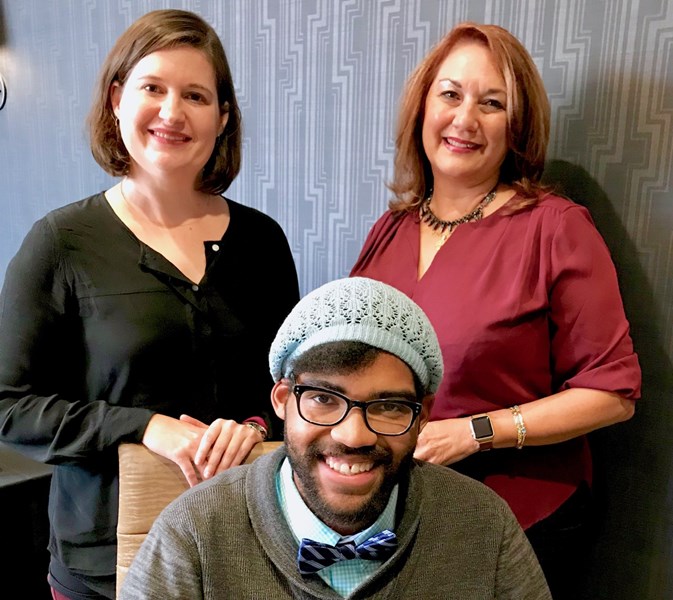 Music therapy naturally allows individuals with intellectual and developmental disabilities and autism of all ages to develop necessary skills for integrating into the community and to maximize their quality of life through living, learning, work, and leisure. The speakers in this AMTA-Pro podcast describe three active music therapy programs providing unique opportunities for inclusion and meaningful community engagement for individuals with special needs. Dr. Ellary Draper talks about inclusive pop choirs formed in collaboration between high school choral directors and the University of Alabama Music Therapy Program. These choirs, designed specifically to include students with mild, moderate, and severe disabilities alongside their typical peers, perform regularly in the community and serve as practicing sites for undergraduate music therapy and music education students. Our colleague Helen Dolas shares information about the Able ARTS Work, founded in 1982, which provides education and life-skills coaching to children, adolescents, and adults with developmental disabilities. Professionals use pioneering, evidence-based therapeutic techniques tailored to meet individual needs and goals of participants at the Creative Health and Wellness Clinic and the Mobile Arts program of Able ARTS Work. Music therapist Grant Hale describes his unique ArtBeat Radio program, a potpourri of short podcasts featuring the thoughts, music, and creativity of adults with disabilities and musicians in the greater LA area. The goal of ArtBeat Radio is to explore the myriad ways in which the resident artists of Able ARTS Work can make their unique voices heard by engaging the ever-expanding virtual world. Take a minute to listen and learn about these innovative music therapy services.
Music therapy naturally allows individuals with intellectual and developmental disabilities and autism of all ages to develop necessary skills for integrating into the community and to maximize their quality of life through living, learning, work, and leisure. The speakers in this AMTA-Pro podcast describe three active music therapy programs providing unique opportunities for inclusion and meaningful community engagement for individuals with special needs. Dr. Ellary Draper talks about inclusive pop choirs formed in collaboration between high school choral directors and the University of Alabama Music Therapy Program. These choirs, designed specifically to include students with mild, moderate, and severe disabilities alongside their typical peers, perform regularly in the community and serve as practicing sites for undergraduate music therapy and music education students. Our colleague Helen Dolas shares information about the Able ARTS Work, founded in 1982, which provides education and life-skills coaching to children, adolescents, and adults with developmental disabilities. Professionals use pioneering, evidence-based therapeutic techniques tailored to meet individual needs and goals of participants at the Creative Health and Wellness Clinic and the Mobile Arts program of Able ARTS Work. Music therapist Grant Hale describes his unique ArtBeat Radio program, a potpourri of short podcasts featuring the thoughts, music, and creativity of adults with disabilities and musicians in the greater LA area. The goal of ArtBeat Radio is to explore the myriad ways in which the resident artists of Able ARTS Work can make their unique voices heard by engaging the ever-expanding virtual world. Take a minute to listen and learn about these innovative music therapy services.
Music Therapy in Schools: Laws & Court Decisions
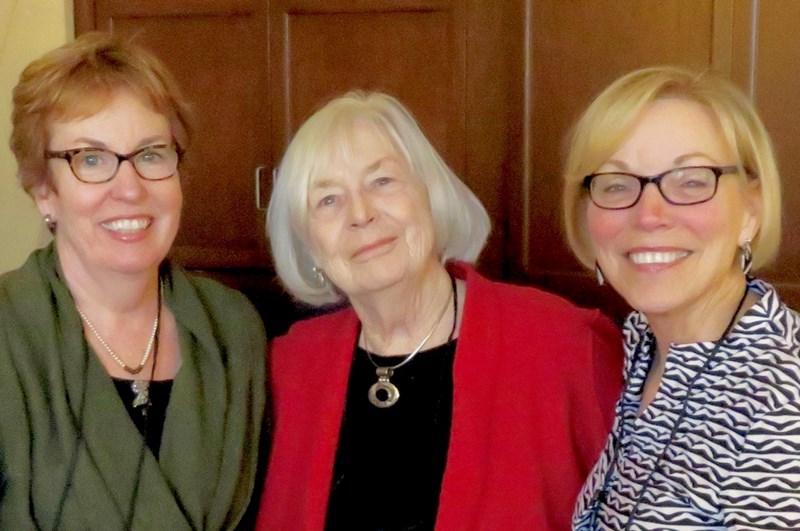 Laws passed by the US Congress and Supreme Court decisions ensure quality educational services for students with disabilities. Recently, the Every Student Succeeds Act (ESSA) and the Supreme Court case, Endrew F. v. Douglas County School District emerged as landmark events significantly impacting special education services. In this AMTA-Pro podcast, Alice-Ann Darrow, Judith Jellison, Mary Adamek overview the recent legislation and court decisions, identify ways to advocate for music therapy services in schools based on the legislative and court actions, and share valuable resources critical for staying informed about updates regarding special education services and music therapy.
Laws passed by the US Congress and Supreme Court decisions ensure quality educational services for students with disabilities. Recently, the Every Student Succeeds Act (ESSA) and the Supreme Court case, Endrew F. v. Douglas County School District emerged as landmark events significantly impacting special education services. In this AMTA-Pro podcast, Alice-Ann Darrow, Judith Jellison, Mary Adamek overview the recent legislation and court decisions, identify ways to advocate for music therapy services in schools based on the legislative and court actions, and share valuable resources critical for staying informed about updates regarding special education services and music therapy.
Ethics of Online Music Therapy Research
 As the nature of research moves toward online resources and methods, music therapists must take time to explore the ethics of online research. Our colleague Nicki Cohen, a member of the AMTA Research Committee, takes time in this AMTA-Pro podcast to share insights and considerations related to ethics and music therapy research. Using specific examples, Nicki discusses basic ethical principles, a brief history of unethical landmark research which resulted in legislation, and the advantages and disadvantages of online research methods. She overviews types of online research methods as well as viable software options for online interviews and online surveys. As Nicki says in the podcast, ethics in online music therapy research is simply a matter of "being honest and respectful to the participants and being honest and respectful when reporting the results of your research." This podcast provides practical guidelines for doing just that.
As the nature of research moves toward online resources and methods, music therapists must take time to explore the ethics of online research. Our colleague Nicki Cohen, a member of the AMTA Research Committee, takes time in this AMTA-Pro podcast to share insights and considerations related to ethics and music therapy research. Using specific examples, Nicki discusses basic ethical principles, a brief history of unethical landmark research which resulted in legislation, and the advantages and disadvantages of online research methods. She overviews types of online research methods as well as viable software options for online interviews and online surveys. As Nicki says in the podcast, ethics in online music therapy research is simply a matter of "being honest and respectful to the participants and being honest and respectful when reporting the results of your research." This podcast provides practical guidelines for doing just that.
Moving Forward with Music Therapy Perspectives
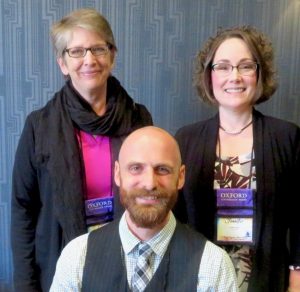 Music Therapy Perspectives (MTP), AMTA’s peer reviewed journal speaking to clinical practice, was launched in the 1980’s and is moving forward at a dizzying pace. In this AMTA-Pro podcast, MTP’s incoming Editor-in-Chief, Dr. Laura Beer along with Associate Editors Dr. Jennifer Jones and Dr. Noah Potvin discuss AMTA’s partnership with Oxford University Press, highlighting a variety of avenues for music therapists and the broader audience to access the content of MTP in new and unique ways. The editorial team encourages clinicians, researchers, and even students to write and submit articles. The MTP Mentorship service is available to help MT-BCs craft the beginning of an idea into an article to share with other clinicians. MTP’s new Clinical Portraits section provides a forum for articles about exploratory research, emerging treatment practices and protocols, unique client populations, and new strategies for teaching or supervising students and interns. Listeners of this AMTA-Pro podcast also learn about a variety of online platforms – Facebook, Twitter, Instagram, YouTube blogs, and virtual issues – designed to increase dissemination of MTP content, to encourage interaction with researchers and clinicians, and, ultimately, to further the practice of music therapy.
Music Therapy Perspectives (MTP), AMTA’s peer reviewed journal speaking to clinical practice, was launched in the 1980’s and is moving forward at a dizzying pace. In this AMTA-Pro podcast, MTP’s incoming Editor-in-Chief, Dr. Laura Beer along with Associate Editors Dr. Jennifer Jones and Dr. Noah Potvin discuss AMTA’s partnership with Oxford University Press, highlighting a variety of avenues for music therapists and the broader audience to access the content of MTP in new and unique ways. The editorial team encourages clinicians, researchers, and even students to write and submit articles. The MTP Mentorship service is available to help MT-BCs craft the beginning of an idea into an article to share with other clinicians. MTP’s new Clinical Portraits section provides a forum for articles about exploratory research, emerging treatment practices and protocols, unique client populations, and new strategies for teaching or supervising students and interns. Listeners of this AMTA-Pro podcast also learn about a variety of online platforms – Facebook, Twitter, Instagram, YouTube blogs, and virtual issues – designed to increase dissemination of MTP content, to encourage interaction with researchers and clinicians, and, ultimately, to further the practice of music therapy.
What IS Mindfulness Anyway?
Mindfulness has become a popular trend in business, education, and health care but is often misunderstood. In this AMTA-Pro podcast, our music therapy colleague Anne Parker takes a look at mindfulness from various perspectives to understand how it can positively impact our practice as music therapists. Anne was the featured speaker at the Carol Bitcon Memorial Lecture at the 2017 AMTA Conference in St. Louis, Missouri based on her experience as a music therapist for 40 years and as a student and teacher of mindfulness for over 20 years.
2017 Podcasts:
Interprofessional Education and Music Therapy
Interprofessional Health Care Education is being implemented in a growing number of universities, allowing students, clinicians, and professors in various health care professions to learn about other areas and to experience collaboration. This AMTA-Pro podcast features two music therapy educators, Dr. Andrew Knight of Colorado State University and Dr. Meganne Masko of Indiana University-Purdue University along with Eric Johnson, MD of University of North Dakota, all three of whom have teamed up with other health care professionals in three different universities. These knowledgeable colleagues discuss the growth of IPE (Interprofessional Education), their experiences and observations over the years, and the possibilities for the future. The text section of this AMTA-Pro podcast includes access to a comprehensive handbook with details about Interprofessional Health Care Education program structure, course curriculum, grants, and research, as well as implications for music therapy practice.
Nordoff-Robbins Music Therapy
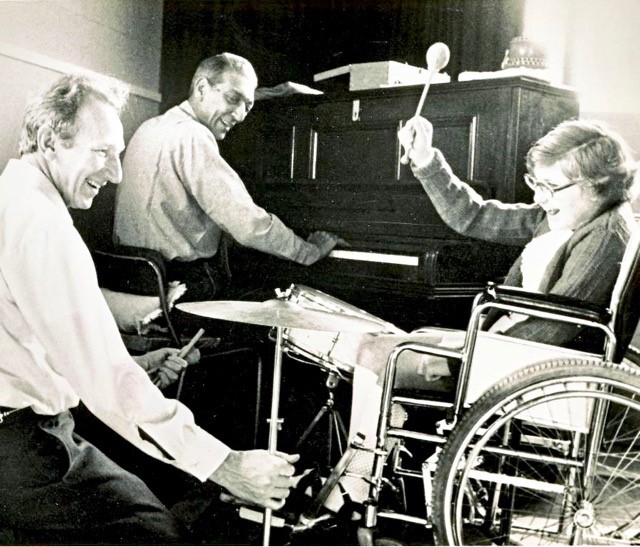 This historic photograph of Paul Nordoff and Clive Robbins “musicing” with a young lady captures the spirit and impact of our daily work as music therapists. Music therapy colleagues Dr. Alan Turry and Jacqueline Birnbaum sat down at the AMTA-Pro microphone to explore the history and practice of Nordoff-Robbins music therapy, and to share songs and stories illustrating the music-centered approach to therapy where elements of music, active listening, creativity, flexibility, and interactive music-making are used in the clinical process. Among other things, Alan and Jackie tell of Paul Nordoff’s music therapy with Johnny and with Edward, clinical stories accompanied by historic recordings from Nordoff’s work in the 1950s. This AMTA-Pro podcast begins and ends with Alan and Jackie making music and includes examples of the co-creative partnership of music and therapy, e.g., the therapist’s observations of each individual’s interaction with and response to all the elements of music when developing customized music therapy sessions. The text section of this AMTA-Pro podcast includes additional resources, photographs and other information.
This historic photograph of Paul Nordoff and Clive Robbins “musicing” with a young lady captures the spirit and impact of our daily work as music therapists. Music therapy colleagues Dr. Alan Turry and Jacqueline Birnbaum sat down at the AMTA-Pro microphone to explore the history and practice of Nordoff-Robbins music therapy, and to share songs and stories illustrating the music-centered approach to therapy where elements of music, active listening, creativity, flexibility, and interactive music-making are used in the clinical process. Among other things, Alan and Jackie tell of Paul Nordoff’s music therapy with Johnny and with Edward, clinical stories accompanied by historic recordings from Nordoff’s work in the 1950s. This AMTA-Pro podcast begins and ends with Alan and Jackie making music and includes examples of the co-creative partnership of music and therapy, e.g., the therapist’s observations of each individual’s interaction with and response to all the elements of music when developing customized music therapy sessions. The text section of this AMTA-Pro podcast includes additional resources, photographs and other information.
Single-Session Music Therapy in Acute Mental Health
Michael Silverman specializes in music therapy for adults with mental illnesses and substance abuse disorders. In this AMTA-Pro podcast, he talks about single-session music therapy for individuals dealing with complex problems with complicated solutions. Although single-session psychiatric treatment is not ideal under these circumstances, it is a reality more often than not. But progress is evident when Michael uses high-quality, customized live music to develop connections and when he helps individuals remain realistic and focused as they develop solutions and identify resources available to them in the short term and in the community. Illness management and recovery is an established, evidenced-based treatment emphasizing functional management of the disease and promoting recovery. Michael provides a concise and clear overview in this podcast of educational music therapy interventions, research literature, and how to expediently engage patients in treatment in acute care mental health settings.
DBT-Informed Music Therapy
The speakers in this AMTA-Pro podcast - Abbby Dvorak, Lindsey Landeck, Marie Lesiak, and Deborah Spiegel - have extensive clinical experience working with Dialectical Behavior Therapy (DBT) and music therapy. Dialectical Behavior Therapy is an active treatment model building skills in four key areas: mindfulness, distress tolerance, emotion regulation, and interpersonal effectiveness. The speakers talk in depth about ways DBT can enhance an MT-BC's music therapy practice as well as how music therapy may enhance and support DBT skills training in the clinical setting. These experienced MT-BCs demonstrate some clinical interventions in the podcast and discuss research applications for music therapy and Dialectical Behavior Therapy. The text section of this AMTA-Pro podcast includes a detailed list of resources about DBT and music therapy as well as bios of the speakers.
Unanticipated Findings of Music Therapy Pilot Study
Active Music Engagement (AME) is a music-based play intervention designed to address parent and young child cancer treatment-related distress. Positive results from earlier research based on therapist-led interventions led to the next step of translating Active Music Engagement for parent delivery to increase accessibility and sustainability. Music Play Kits were designed for parents to share with their children and enjoy making music together while the music therapist stepped back into a coaching role. Although the pilot study yielded positive results for the children and parents in many areas in this model, one unexpected finding emerged. Parents actually indicated a need for greater support from the music therapist and a preference for therapist-led interventions. Our AMTA-Pro podcast speakers, Sheri Robb and Amanda Henley, discuss the research and clinical practice implications of these findings, and they share details about the continuation of this study with research funded by a $1.4 million National Institutes of Nursing Research grant. This latest research project, involving 15 Board-Certified Music Therapists, 12 Certified Research Associates, and 4 Site-Primary Investigators/Project Managers across three sites, is studying the effect of play interventions, such as active music engagement and storybook programs, on health outcomes in young children ages 3 to 8 undergoing chemotherapy treatment and their parents.
Florence Tyson: Music Therapy Visionary
 Florence Tyson was a trailblazing music therapist who began her work in the 1950s with the Musicians’ Emergency Fund in New York City. Recognizing the need for outpatient treatment for individuals with mental illness, Florence created the Music Rehabilitation Center to provide arts-based community services, thereby decreasing the need for inpatient treatment. In the early 1960s, the agency’s name was changed to the Creative Arts Rehabilitation Center and moved to 51st street in the theater district on the edge of Times Square. Until the mid-1990s, CARC was a space dedicated solely to providing music, art, dance, drama, and poetry for people with mental illness. In this AMTA-Pro podcast, three of Florence’s colleagues - Ken Aigen, Christopher Bandini, and Jeffrey Friedberg - share compelling stories about their work at the CARC, and about the significant impact of CARC and Florence Tyson on the lives of scores of individuals with mental illness as well as on the staff and community.
Florence Tyson was a trailblazing music therapist who began her work in the 1950s with the Musicians’ Emergency Fund in New York City. Recognizing the need for outpatient treatment for individuals with mental illness, Florence created the Music Rehabilitation Center to provide arts-based community services, thereby decreasing the need for inpatient treatment. In the early 1960s, the agency’s name was changed to the Creative Arts Rehabilitation Center and moved to 51st street in the theater district on the edge of Times Square. Until the mid-1990s, CARC was a space dedicated solely to providing music, art, dance, drama, and poetry for people with mental illness. In this AMTA-Pro podcast, three of Florence’s colleagues - Ken Aigen, Christopher Bandini, and Jeffrey Friedberg - share compelling stories about their work at the CARC, and about the significant impact of CARC and Florence Tyson on the lives of scores of individuals with mental illness as well as on the staff and community.
Music Therapy Licensure in Oregon
As of January 1, 2016, music therapy is a licensed profession in Oregon. The bill reads, “A person may not practice music therapy, assume or use any title, words or abbreviations, including the title or designation ‘music therapist,’ that indicate the person is authorized to practice music therapy unless the person is licensed. Only those agencies with qualified personnel may claim to offer music therapy services.” In November, 2016, four members of the Oregon State Government Relations Task Force - Jodi Winnwalker, Lillieth Grand, Angie Kopshy, and Chris Korb - gathered around the AMTA-Pro microphone to talk about the steps taken to achieve this ambitious goal. Beginning in 2007 with AMTA’s Judy Simpson’s issue of a Call to Action, the efforts of dozens of music therapists in Oregon, working with the guidance of government relations experts from AMTA and CBMT, resulted in Oregon licensure in 2016. The podcast speakers talk about that process, and they overview the necessary follow-up of the licensing legislation while encouraging music therapists in other states to step up to the plate and work diligently toward licensure.
2016 Podcasts:
Generalizing Music Therapy to Home Life
How can music therapy’s impact be maximized in the home environment? What steps can a music therapist take to help music therapy clients and their caregivers generalize what they have learned in music therapy to their everyday life? In this AMTA-Pro podcast, experienced music therapy clinician Ronna Kaplan discusses time‐tested and “family‐approved” areas of concentration in music therapy sessions that then translate and transfer to home. The case examples covers three areas of focus that arise daily for individual music therapy clients and their families and caregivers, i.e., music therapy for learning, for living, and for the love of music.
Can Music Support Emotion Regulation Development?
 Emotion Regulation (ER) development occurs in early childhood. Music therapists encounter many clinical populations who experience barriers to healthy ER development for a variety of reasons. In this AMTA-Pro podcast, our music therapy colleague Dr. Kimberly Sena Moore reports results from a mixed methods feasibility study exploring the impact of a music‐based intervention on ER development. She discusses the implications of the research findings in relation to how they influence clinical music therapy practice and future research. Emotion Regulation (ER) development occurs in early childhood. Music therapists encounter many clinical populations who experience barriers to healthy ER development for a variety of reasons. In this AMTA-Pro podcast, our music therapy colleague Dr. Kimberly Sena Moore reports results from a mixed methods feasibility study exploring the impact of a music‐based intervention on ER development. She discusses the implications of the research findings in relation to how they influence clinical music therapy practice and future research.
Emotion Regulation (ER) development occurs in early childhood. Music therapists encounter many clinical populations who experience barriers to healthy ER development for a variety of reasons. In this AMTA-Pro podcast, our music therapy colleague Dr. Kimberly Sena Moore reports results from a mixed methods feasibility study exploring the impact of a music‐based intervention on ER development. She discusses the implications of the research findings in relation to how they influence clinical music therapy practice and future research. Emotion Regulation (ER) development occurs in early childhood. Music therapists encounter many clinical populations who experience barriers to healthy ER development for a variety of reasons. In this AMTA-Pro podcast, our music therapy colleague Dr. Kimberly Sena Moore reports results from a mixed methods feasibility study exploring the impact of a music‐based intervention on ER development. She discusses the implications of the research findings in relation to how they influence clinical music therapy practice and future research.
Funding Music Therapy through Philanthropy

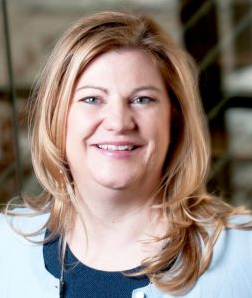 Philanthropy is a viable funding source for music therapy programs. Based on their experience in successfully funding and expanding a pediatric hospital-based music therapy program through philanthropy, Dr. Annie HeiderscheIt and Jana Koppula are particularly aware of the importance of understanding the complex aspects of donor relationships in order to build and maintain a philanthropically funded program. Their conversation in this AMTA-Pro podcast includes examples of building successful donor relationships, gathering and presenting data to donors, and addressing donor expectations. The experience and expertise of these two music therapy colleagues is helpful to music therapists who are considering pursuing philanthropy as a source for funding music therapy services in any clinical setting.
Philanthropy is a viable funding source for music therapy programs. Based on their experience in successfully funding and expanding a pediatric hospital-based music therapy program through philanthropy, Dr. Annie HeiderscheIt and Jana Koppula are particularly aware of the importance of understanding the complex aspects of donor relationships in order to build and maintain a philanthropically funded program. Their conversation in this AMTA-Pro podcast includes examples of building successful donor relationships, gathering and presenting data to donors, and addressing donor expectations. The experience and expertise of these two music therapy colleagues is helpful to music therapists who are considering pursuing philanthropy as a source for funding music therapy services in any clinical setting.
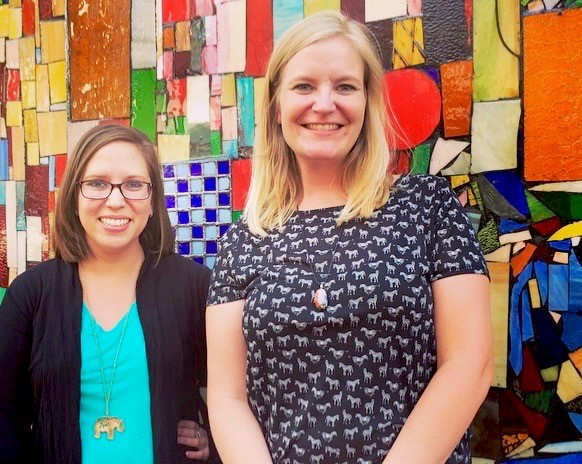 Forensic Psychiatric Hospital: Music Therapy & Art Therapy
Forensic Psychiatric Hospital: Music Therapy & Art Therapy
The unique goals of court-committed adults are being addressed in interesting ways by the team of music therapist Alison Etter and art therapist Jaimie Peterson in a forensic psychiatric hospital. In this AMTA-Pro podcast, Etter and Peterson describe a number of creative collaborative interventions giving their clients opportunities to be involved in a performances, exhibits, broadcasts, and publications. The wide-ranging and diverse therapeutic experiences are designed to increase personal connections, reduce stigma, encourage interaction and communication, facilitate leadership and cooperation, and provide opportunities for creative expression through music and art.
Music Therapy Goals from a Musical Perspective
Music in therapy can be viewed not as a "tool" to be "used," but as a guiding principle informing an underlying ethos and driving the work in its entirety. In this understanding, music therapy is construed through an artistic lens, in which the value of the work is understood according to such criteria as experiential depth, narrative coherence, personal meaningfulness, and expressive beauty. In this way of understanding the work, the client's musical constitution, as well as the music therapist’s clinical musicianship, extend themselves to all corners of the therapy. This understanding extends to the targeted outcomes of the work (goals) as well. In this AMTA-Pro podcast, a group of experienced music therapy professionals - Brian Abrams, Kathleen Murphy, Noah Potvin, and Laurel Young - converse about several informed perspectives on ways in which both music therapy processes and goals can be understood in terms of music.
Music Therapy for Adults with IDD, Part 2
The second podcast in this two-part "Music Therapy for Adults with IDD" AMTA-Pro series features an insightful conversation with experienced music therapy clinician, Ellen Rayfield. After 30+ years providing services as an MT-BC and LPC in psychiatric facilities, Ellen switched gears and began working with adults with intellectual developmental disabilities (IDD). Right away, she became aware of the need for more music therapy resources, especially since intellectual and developmental disabilities begin in childhood and last for many decades, requiring life-long intervention and support. In this podcast, Ellen shares her observations about adults with IDD, describes the agency’s services and her music therapy program, and talks about her interactions with and responses of clients in group and individual music therapy. The first podcast in this two-part "Music Therapy for Adults with IDD" AMTA-Pro series features speakers Jennifer Jones, Nicole Rivera, and Todd Schwartzberg who talk about the history of music therapy with adults with IDD, provide an overview of available publications and research, and summarize two descriptive studies as well case examples. All speakers emphasize the need for more music therapy research, forums, publications, and profession-wide emphasis on the unique needs of the expanding population of adults with IDD.
Music Therapy for Adults with IDD, Part 1
The growing need for music therapy services for adults with IDD (intellectual and developmental disabilities), including ASD (autism spectrum disorder), calls for more research, forums, and publications in our field. In this AMTA-Pro podcast, the first of a 2-part series, speakers Jennifer Jones, Nicole Rivera, and Todd Schwartzberg encourage a renewed profession-wide emphasis on the unique needs of this expanding population. They begin that process by talking briefly about the history of music therapy with these adults and providing an overview of available publications and research. They summarize two descriptive studies and talk through case examples with a special focus on post‐high school transitions, adults with Autism Spectrum Disorder, and the unique needs of older adults with IDD. Part 2 of the "MT for Adults with IDD" AMTA-Pro podcast series features an insightful conversation with clinician Ellen Rayfield talking about her work with this population.
Music Therapy Practicum: Intergenerational Choirs
Music therapy students and graduate teaching assistants from Drury University and University of Missouri-Kansas City gathered around the AMTA-Pro podcast microphone to describe their work with an intergenerational choir as a practicum experience. They describe various aspects of the music therapy treatment process, including assessment, session planning, data collection, co-treatment, supervision, and various interventions. Dr. Melita Belgrave, UMKC music therapy professor, joins in the conversation to provide information about the background and overall structure of the intergenerational choir practicum experience. The text section of this AMTA-Pro podcast includes brief bios of the speakers as well as a valuable 24-page resource packet compiled by Dr. Belgrave, Dr. Alice-Ann Darrow, and Dr. Natalie Wlodarczyk, professors who implement intergeneration choir practicums in their university programs at UMKC, Drury University, and Florida State University.
ASD Resources for Music Therapists
In this AMTA-Pro podcast, our music therapy colleague, Marcia Humpal, chair of AMTA’s Strategic Priority on Music Therapy and ASD, tells us about the wealth of resources related to music therapy and Autism Spectrum Disorder available on the AMTA website. Humpal provides an overview of the fact sheets, research, annotated bibliographies, reports, toolkits, brochures, journal articles, training modules, and other resources resulting from time and expertise of the Strategic Priority group and many AMTA members working with individuals with ASD. Some resources are specifically for families and caregivers, some for professionals in related fields, and many for music therapists.
Counseling Micro-Skills for Music Therapists
Music is such a powerful tool in the therapeutic process, a tool that can be intertwined with basic counseling skills to make interpersonal connections while building rapport, empathy and respect. In this AMTA-Pro podcast, our music therapy colleague, Dr. Lori Gooding, discusses research, clinical examples, and application of specific counseling micro-skills such as non-verbal interaction, authentic phrases, supportive statements, minimal encouragers, humor, and more. She talks about ways in which music therapists can use the techniques to impact the therapeutic conversation, diffuse difficult situations, and help reframe words and perspectives in individual, group, and family therapy.
Heart Transplant for MT-BC
Sometimes music therapists hone their clinical skills and expertise through first hand experience. That was, indeed, the case for board certified music therapist Beth Beathard who had only worked 6 months as an MT-BC before she had the first of many serious life-threatening heart events. After 18 difficult months, her medical condition deteriorated to the point of needing a heart transplant. In this compelling AMTA-Pro podcast, Beth describes the physical and emotional challenges she experienced during those months, shares some thoughts about her “self-directed” music therapy, and talks about her personal and professional growth in the seven years since her transplant. Beth’s rocky journey led her from depression, fear and anxiety into a place of hope and sincere gratitude, along with a solid contract for music therapy in a senior living center and the exciting possibility of hospital-based music therapy services for transplant patients. Beth’s AMTA-Pro podcast is being released the week of February 14 – National Donor Day – in celebration of her successful heart transplant and re-entry into her career as a music therapist..
Music Therapy for Survivors of Violence
Violence against women is recognized by the World Health Organization as a serious and pervasive healthcare issue internationally. In this AMTA-Pro podcast, Dr. Sandi Curtis, music therapy professor and clinician, talks about the need for music therapists to be well informed about the latest in research and clinical strategies for helping victims recover and thrive. She talks about her clinical work over the years and challenges her colleagues to get involved. The prevalence of the problem indicates all music therapists will most likely encounter survivors of violence in their daily work. Awareness of the challenges and knowledge of evidence-based approaches equips music therapists to provide provide sensitive, evidence based, effective services for women survivors of violence.
Therapeutic Musicians and Music Therapists
Both music therapists and therapeutic musicians provide services in health care settings. In 2015, there were 5,000 hospitals with over 1 million beds, 16,000 nursing homes with 2 million beds, and 5,800 hospices serving 1 million people. Given there are about 6,500 board certified music therapists and 1,200 therapeutic musicians, and because we all want music available to all these people, it is advisable to recognize the continuum of services and to collaborate rather than compete to increase overall access. This AMTA-Pro podcast features representatives from both groups - Dee Sweeney of the National Standards Board for Therapeutic Musicians (NSBTM) and Judy Simpson of the American Music Therapy Association (AMTA) - conversing about the similarities and differences between music therapy and therapeutic music, and encouraging their colleagues to learn more about both professions. Judy and Dee offer solid recommendations for educating colleagues, administrators, and clients about both music therapy and therapeutic music, and for facilitating conflict resolution when misunderstandings arise. They also discuss specific ways to foster cooperation and explore possible collaborative projects between the two professions.
2015 Podcasts:
Defining the Therapeutic Function of Music
Music is a complex intervention strategy, thus the characteristics of the music are important to therapeutic outcomes. Greater clarity for the role of the musical elements in therapeutic outcomes is desired; yet few strategic methods support the description of the musical elements in the development of treatment interventions. In this AMTA-Pro podcast, Dr. Deanna Hanson-Abromeit overviews an article published in Music Therapy Perspectives, Volume 33, “A Conceptual Methodology to Define the Therapeutic Function of Music.” The article proposes an ante-hoc worksheet to articulate the Therapeutic Function of Music (TFM) Plan. This worksheet helps the music therapist organize the relationship between the treatment goal, theoretical framework and musical elements in order to define the purpose and intent of each musical element. The result is a theory-based synthesis of the music as a whole for therapeutic intervention. The TFM Plan will benefit music therapy with stronger explanations of the therapeutic effect of music, generate consistent application of music characteristics for therapeutic response, support predictable outcomes, and foster a specialized understanding of music as a therapeutic medium differentiated from other professionals using music-based interventions.
Music Therapy @ The Bridge
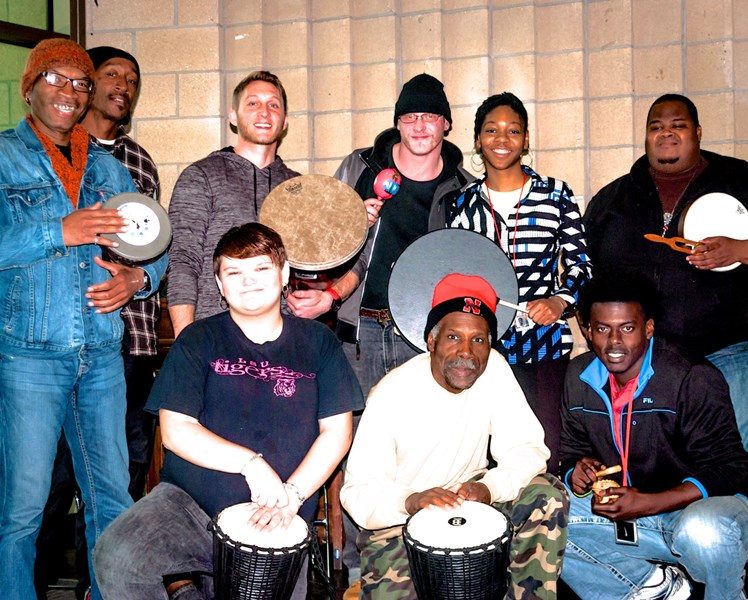 Have you read the book or seen the movie, The Soloist? Did you meet Nathaniel Ayers, the subject of the movie, when he jammed with Al Bumanis at the AMTA conference several years ago? Did you know that, as a result of that connection with Nathaniel Ayers, a music therapy program has been launched at The Bridge, a cutting-edge homeless recovery center in downtown Dallas? Did you know that the music therapy program is an integral part of the Behavioral Health Care services at The Bridge serving many individuals who are dealing with mental illness and/or chemical dependency? This AMTA-Pro podcast features a conversation with some of the key players in the process of launching this music therapy program. Nathaniel Ayers’ sister, Jennifer Ayers-Moore talks about her brother’s study at Julliard, the impact of schizophrenia on his life, their introduction to music therapy by Al Bumanis at an AMTA conference, and her interest in having music therapy services in implemented in homeless recovery services around the country. Sam Merton, CAO at The Bridge, continues the podcast conversation with a brief history and overview of the innovative homeless recovery services offered at The Bridge for thousands of individuals, many of whom are dealing with mental illness or chemical dependency. Board certified music therapist Kamica King tells AMTA-Pro listeners how the music therapy program unfolded at The Bridge and plans for expanding music therapy services. This podcast conversation is just one example of the impact of teamwork on expanding music therapy services for individuals in homeless recovery programs as well as numerous other populations and clinical settings.
Have you read the book or seen the movie, The Soloist? Did you meet Nathaniel Ayers, the subject of the movie, when he jammed with Al Bumanis at the AMTA conference several years ago? Did you know that, as a result of that connection with Nathaniel Ayers, a music therapy program has been launched at The Bridge, a cutting-edge homeless recovery center in downtown Dallas? Did you know that the music therapy program is an integral part of the Behavioral Health Care services at The Bridge serving many individuals who are dealing with mental illness and/or chemical dependency? This AMTA-Pro podcast features a conversation with some of the key players in the process of launching this music therapy program. Nathaniel Ayers’ sister, Jennifer Ayers-Moore talks about her brother’s study at Julliard, the impact of schizophrenia on his life, their introduction to music therapy by Al Bumanis at an AMTA conference, and her interest in having music therapy services in implemented in homeless recovery services around the country. Sam Merton, CAO at The Bridge, continues the podcast conversation with a brief history and overview of the innovative homeless recovery services offered at The Bridge for thousands of individuals, many of whom are dealing with mental illness or chemical dependency. Board certified music therapist Kamica King tells AMTA-Pro listeners how the music therapy program unfolded at The Bridge and plans for expanding music therapy services. This podcast conversation is just one example of the impact of teamwork on expanding music therapy services for individuals in homeless recovery programs as well as numerous other populations and clinical settings.
Music-Centered Music Therapy
Music therapists recognize our clients often want the same thing from music therapy as all people want from music: an essentially musical experience that meets an inborn need. In music-centered thinking, musical experiences are not merely tools to nonmusical ends, but can also serve as appropriate goals of music therapy. In this AMTA-Pro podcast, Dr. Ken Aigen talks about two main topics: a critique of some aspects of the conventional wisdom about the nature of music therapy (as embodied in the tenets of evidence-based practice), and a discussion of some of the attributes of an alternative vision of music therapy known as music-centered music therapy.
Music Therapy in Journey from Illness to Health
Although each person’s experience with illness is different, their initial discomfort and concerns increase as the signs and symptoms of illness emerge. The path from illness to health moves past that initial onset state through the phases of diagnosis, acceptance, treatment, recovery, rehabilitation, and re-entry to the world of the healthy. AMTA-Pro podcast speakers, Dr. Suzanne Hanser and Jeniris González, overview of the role music therapy can play in each stage of the journey from the onset of illness to a new healthy identity. They also discuss some evidence-based music therapy strategies for the management of stress, pain, unpleasant symptoms, response to illness, and treatment side effects, while enhancing the quality of life. The text section of this podcast provides resources and samples of songwriting and other interventions as well as templates for a music listening log, for songwriting, and for planning effective music interventions in each stage of the journey from illness to health.
Understanding Military Culture
After earning the rank of Captain in the United States Navy and serving for 25 years, Becky Jo Watson retired and earned her MT-BC status. She recently sat down in front of the AMTA-Pro microphone to share her experiences and unique insights in an effort to help her music therapy colleagues understand military culture in order to better serve active duty military members and veterans. In this AMTA-Pro podcast, Becky talks about the pressing need for more music therapy services, and she shares 7 C’s - basic principles for music therapists to consider when developing music therapy services and strategies for contributions to readiness, rehabilitation, recovery, and wellness among America’s military populations, both active duty service members and veterans. This informative AMTA-Pro podcast compliments the AMTA E-course, Music Therapy and Military Populations, based on a 2014 status report presented by the American Music Therapy Association about music therapy treatment, programs, research, and practice policy. The briefing report presents exemplary model programs and highlights the strong foundation of published research and evidence to inform practice.
International Perspectives from Music Therapy Students
Dr. Dena Register challenged some of her music therapy students in her Current Trends in Music Therapy class at the University of Kansas to explore music therapy from the international perspective. The resulting topics for their individual projects included, among others, eating disorders from a global perspective, music therapy trends in disaster response, instruments around the world, music therapy and environmental noise in ICU, and development of MT in three Asian countries. The students shared the results of their projects in a session at the 2014 AMTA conference in Louisville, KY. Tune into this AMTA-Pro podcast featuring Fatima Chan, Emilyjane Eichman, Cole Eisenmenger, Bing Li, Katie Martin, Alison Smiley, and Rachel Zarich as they overview their conference session about diverse topics of interest to music therapy professionals.
Storytelling in Music Therapy
Throughout history, people have been inherently drawn to telling and listening to stories, and music enhances the experiences. In this AMTA-Pro podcast, Ron Borczon, Director of Music Therapy at California State University Northridge and of the Music Therapy Wellness Clinic, provides some compelling insights about music in storytelling, and shares some experiences in his clinical work. Ron talks about various aspects of the art of storytelling, the symbolic nature of the story, the listening environment, the role of music in the storytelling experience, and the different levels of processing stories with clients in music therapy group and individual sessions. Podcast listeners learn about using stories and myths in music therapy, and hear some thought-provoking stories accompanied by music, percussion, and an enchanting zither.
Neuroplasticity Model of Music Therapy
Why does music therapy work? In this AMTA-Pro podcast, Dr. Elizabeth Stegemoller talks informally to her music therapy colleagues about the neuroplasticity model of music therapy. She discusses the impact of music on critical dopamine production, about the Hebbian Principle, and about the value of the clear signal of music as opposed to noise. Elizabeth discusses practical application of the principles in the neuroplasticity model as used in music therapy for individuals with Parkinson’s. She talks about music’s role in cortical remapping and building alternative pathways that reroute an individual’s control over their movement. Once the alternative pathways are in place, the music therapist fades the musical stimuli, allowing the individual with Parkinson’s to function more independently. The neuroplasticity model of music therapy needs further research, but gives us some insights into that ever-present question, “Why does music therapy work?”
Music Therapy & Adolescents with ASD
Dr. John Carpente takes time in this AMTA-Pro podcast to share some insights gained from his work with teenagers diagnosed with autism at the Rebecca Center for Music Therapy housed at Molloy College in New York. Guided by principles of the DIR Floor Time Model in tandem with Nordoff-Robbins music therapy, John involves the youngsters in music-making experiences - joining together with the band - to foster social-emotional development. In this informal podcast, John, founder and director at the Rebecca Center, talks about the progress made by two adolescent students when actively involved in making music with the music therapist.
2014 Podcasts:
Music Therapy and Infant-Directed Singing
Tune into this AMTA-Pro podcast to learn of the research of our music therapy colleague Shannon de l’Etoile related to infant-directed singing and infant self-regulation. In this conversation, recorded at the AMTA conference in November, 2013, Dr. de l’Etoile talks about the universal nature of mothers singing to their infants and the resulting benefits of maintaining attention and leading the infant to a comfortable state of arousal. She discusses her clinical work in this area and the series of studies that led her to focus on the impact of infant-directed singing when either the mother or the infant is at risk and not responding to the interaction, research that has far-reaching implications for music therapy. Shannon also takes time during this podcast to overview the outstanding music therapy program at University of Miami Frost School of Music.
Music Therapy in Early Brain and Child Development
The American Academy of Pediatrics Initiative released in 2013 stems from continued research about the impact of early support and development on prevention of later health issues. The AAP Initiative, intended to transform pediatric practice, focuses on the first 1000 days of life as most critical in brain development. In this AMTA-Pro podcast, music therapist Dr. Becky Wellman talks about the parallels between the AAP Initiative and music therapy practice. She informally shares examples of ways in which music therapists working with children in their first three years often design music therapy interventions and sessions to encourage positive, interactive parenting and to address the five areas emphasized in the AAP Initiative, i.e., reading, rhyming, routine, reward, and relationship.
Music Therapy with Foster Care Youth
Dr. Michael Zanders, PhD, LPC, MT-BC, an assistant professor of music therapy at Texas Woman's University, began working with the child welfare system some years ago. Many of his recent publications and presentations focus on music therapy with foster care youth. In this interesting AMTA-pro podcast, Dr. Zanders talks about his work with children and adolescents in the CPS foster system and he provides an informal, brief review of his qualitative research examining the personal and musical lives of adolescents with foster care experience. This innovative research certainly has implications for music therapy research, theory, and practice for adolescents in foster care, a promising new field of practice for music therapists.
The A Capella Voice
Beth Schwartz holds an interesting and informative discussion about developing, expanding, and exploring our voices as a therapeutic tool. Every music therapist uses his or her voice in clinical work whether it is humming to an infant in the NICU or adjusting the timbre and intonation of a speaking voice in verbal processing. Because music therapists do not always receive specific vocal training for using the voice as a clinical instrument, Beth found it necessary to create some basic, practical tips and techniques for helping music therapy students find and expand their own clinical voice. She shares some examples and specific techniques in this AMTA-Pro podcast in hopes of opening a discussion on the importance of helping all music therapists add specific vocal practices, techniques, and understandings to their clinical knowledge and repertoire.
Roots of Music Therapy: An Interview with Dr. Olin G. Parker
 After returning from service in WWII, Olin Parker continued his education at University of Kansas, studying with Dr. E.Thayer Gaston and other pioneers in the field of music therapy. In 2013, Dr. Parker is Professor Emeritus of Music and Associate Director Emeritus of the Hugh Hodgson School of Music at University of Georgia. He continues to be active in AMTA at age 91, and to teach some college classes, a career in higher education he started 49 years ago. In this AMTA-Pro podcast, Dr. Parker talks with one of his former music students, Amber Weldon-Stephens, and with music therapist, Cathy Knoll, about events in the late 1940’s that resulted in the birth of music therapy as a profession, about his interactions with Dr. E.Thayer Gaston and other pioneers in the field, and about his interesting experiences over the past decades. Dr. Parker provides intriguing insights about our profession and amusing anecdotes about music therapy
After returning from service in WWII, Olin Parker continued his education at University of Kansas, studying with Dr. E.Thayer Gaston and other pioneers in the field of music therapy. In 2013, Dr. Parker is Professor Emeritus of Music and Associate Director Emeritus of the Hugh Hodgson School of Music at University of Georgia. He continues to be active in AMTA at age 91, and to teach some college classes, a career in higher education he started 49 years ago. In this AMTA-Pro podcast, Dr. Parker talks with one of his former music students, Amber Weldon-Stephens, and with music therapist, Cathy Knoll, about events in the late 1940’s that resulted in the birth of music therapy as a profession, about his interactions with Dr. E.Thayer Gaston and other pioneers in the field, and about his interesting experiences over the past decades. Dr. Parker provides intriguing insights about our profession and amusing anecdotes about music therapy.
2013 Podcasts:
Music Therapy in Community Music Schools
Don't miss this lively conversation between three of our music therapy colleagues, all directors of music therapy programs in community music schools, talking about innovative music therapy programs and services for individuals as well as for social service, medical, and education agencies in their communities. Because there are about one hundred community music schools around the country, and only twenty have music therapy services, possibilities for establishing new music therapy programs abound. In this AMTA-Pro podcast, Eve Montague shares insights based on her experience of starting up a new music therapy program in the prestigious South Shore Conservatory in Massachusetts. Maria Batista-Hancock talks about the quality services provided by nine music therapists at the Hochstein Music School in Rochester, New York as well as some exciting new initiatives. Ronna Kaplan describes the music therapy program at The Music Settlement in Cleveland, Ohio which started in 1966 under the leadership of Louise Steele, and continues today with twelve music therapists providing innovative services impacting the lives of a number of children and adults facing a wide range of life's challenges.
Music Therapy for Older People
The AMTA-Pro podcast for July, 2013, Music Therapy for Older People, begins with our colleague Dr. Anne Lipe sharing an overview of music therapy with older adults, including the history of music therapy services with this diverse population, the impact of the 1991 hearing before the U.S. Senate Special Committee on Aging on the growth of music therapy services and research, and the broad range of possibilities for music therapy services across the spectrum for older people living independently in the community, individuals in assisted living and adult day care, and people living in long-term care facilities. The second part of this podcast features the work of music therapists Dr. Betsey King and Laurie Keough in a privately funded music therapy demonstration project for individuals living in the community who are diagnosed with Alzheimer’s. The project, which has since been replicated, not only resulted in the documentation of, among other things, a decrease in agitation and perseveration of words and phrases as well as an increase in social interaction for the participants, but also confirmed the validity of assessment-based small-group and individual music therapy as a cost-effective service significantly impacting quality of life. This podcast ends with an informal discussion of the exciting possibilities for growth in music therapy services for older people in the community and in long-term care.
Music Therapy with Military Service Members
In addition to her work with other populations, board-certified music therapist Rebecca Vaudreuil provides group and individual music therapy to military service members diagnosed with PTSD, TBI, physical injuries, substance abuse, chemical dependency, and other challenges. In this AMTA-Pro podcast, Rebecca gives us an overview of the role of music therapy and the structure of services provided to all branches of the military in inpatient programs as well as in Wounded Warrior Battalion transition and community reintegration programs. She describes real life situations illustrating the value of music therapy professionals and interns teaming up with recreation therapists, volunteers, family members, recording artists, and the San Diego community in order to provide effective and life-changing experiences for military service members. The text section of this AMTA-Pro podcast includes links to videos featuring songs written by and/or performed by people involved in group and individual music therapy.
Music Therapists Surviving Cancer
 Music therapists Ashley Taylor, Lisa Gallagher, Megan Peterson, Carolyn Bowes, Heather Lantry, Faith Halverson-Ramos, and JoAnn Jordan gathered around the AMTA-Pro microphone. What do these colleagues have in common? All have experienced cancer from different viewpoints. Some are in active treatment, some are celebrating "cancer-versaries", some are clinicians working with individuals diagnosed with cancer, and some have family members with cancer. In this podcast, they talk briefly about some challenges related to their cancer, and they share some thoughtful insights and suggestions for music therapists working with people diagnosed with cancer.
Music therapists Ashley Taylor, Lisa Gallagher, Megan Peterson, Carolyn Bowes, Heather Lantry, Faith Halverson-Ramos, and JoAnn Jordan gathered around the AMTA-Pro microphone. What do these colleagues have in common? All have experienced cancer from different viewpoints. Some are in active treatment, some are celebrating "cancer-versaries", some are clinicians working with individuals diagnosed with cancer, and some have family members with cancer. In this podcast, they talk briefly about some challenges related to their cancer, and they share some thoughtful insights and suggestions for music therapists working with people diagnosed with cancer.
Music Therapy and Parkinson's
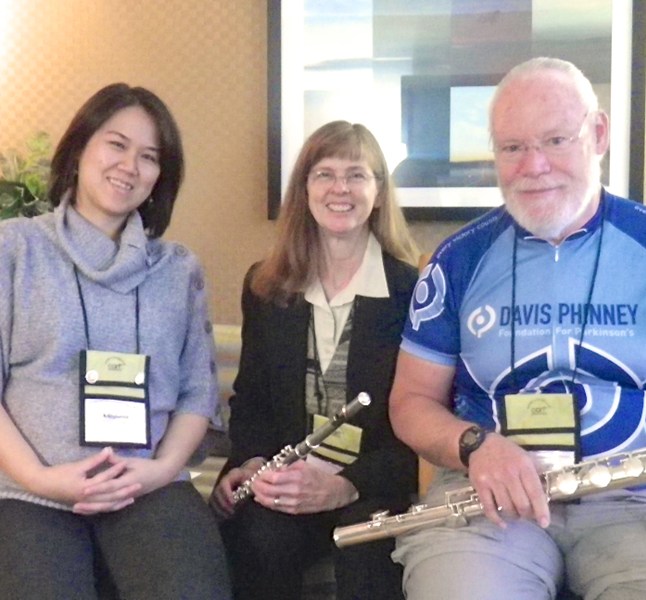 Three music therapists gathered around the AMTA-Pro microphone for an hour, and the resulting podcast is nothing short of amazing. Music therapists Megumi Azekawa, Jeanne Quam, and Steve Quam experience Parkinson’s from three vastly different perspectives. Megumi is involved in the clinical and music therapy research aspect; Steve lives inside Parkinson’s after being diagnosed with the condition; and Jeanne experiences Parkinson’s from the perspective of spouse and care partner. All three music therapists share insights, experiences, and wisdom of great value to their colleagues. Megumi talks about her clinical work with a singing and vocal exercise music therapy group for individuals with PD based on her thesis study. Jeanne provides insights from the care partner perspective. Of particular interest is Steve’s conversation about the impact of Parkinson's on his ability to play flute, and his cross-country trips to raise awareness of Parkinson’s - trips taken via bicycle!
Three music therapists gathered around the AMTA-Pro microphone for an hour, and the resulting podcast is nothing short of amazing. Music therapists Megumi Azekawa, Jeanne Quam, and Steve Quam experience Parkinson’s from three vastly different perspectives. Megumi is involved in the clinical and music therapy research aspect; Steve lives inside Parkinson’s after being diagnosed with the condition; and Jeanne experiences Parkinson’s from the perspective of spouse and care partner. All three music therapists share insights, experiences, and wisdom of great value to their colleagues. Megumi talks about her clinical work with a singing and vocal exercise music therapy group for individuals with PD based on her thesis study. Jeanne provides insights from the care partner perspective. Of particular interest is Steve’s conversation about the impact of Parkinson's on his ability to play flute, and his cross-country trips to raise awareness of Parkinson’s - trips taken via bicycle!
Music Therapy Research
Dr. Laura Brown takes a brief break from teaching music therapy students at Western Illinois University for an AMTA-Pro Podcast interview about her research into the impact of music on emotional processing in the social interaction of children diagnosed with autism. This is the first step in a line of research that will inform music therapy practice for individuals with autism. Laura also talks about the role of research in clinical music therapy, the need for continuing to build on the research foundation in music therapy, and the exciting possibilities for the future of music therapy.
Music Therapy with Medically Fragile Infants
Amy Smith, a Certified Child Life Specialist and Board Certified Music Therapist, works in the Neonatal Intensive Care Unit at Children's Memorial Hermann Hospital in Houston, Texas. In this AMTA-Pro Podcast, Amy describes situations she encounters in her daily work and ways in which music therapy interventions impact the infants and their families during these critical days. For example, she discusses ways in which music can help parents connect with their little ones, normalize interactions, develop family rituals and familiar routines in the hectic hospital atmosphere, help their baby reach developmental milestones even when chronically ill, and celebrating in the midst of stress. Amy's experience and insights are valuable to all music therapists, and a call for continued research and advances in clinical practice for music therapy with medically fragile infants.
2012 Podcasts:
Barbara Reuer: Music Therapy Mover and Shaker
Music therapy took an unexpected turn in San Diego, CA when Dr. Barbara Reuer moved into town. In this AMTA-Pro podcast, Barb talks about innovative programs, the expansion of music therapy services in the community, the "business" of music therapy, and the thrill of training new therapists. She also shares some heartfelt stories about ways in which music and therapy have touched her life. The text segment of this AMTA-Pro podcast includes more information about Barb’s work as well as links to the websites of her music therapy programs.
Debbie Dacus: Music Therapy from Different Angles
Debbie Dacus has viewed and experienced music therapy from several different angles. She has 25 years of clinical experience in various settings, including a multiple disability rehabilitation clinic, metroplex public schools, and her private clinic specializing in music therapy services for children diagnosed with autism and other disabilities. Debbie has published several books and coauthored several music therapy resources, and is currently preparing to teach at the university level. In her "spare" time, Debbie is a professional singer. In this AMTA-Pro podcast, Debbie shares compelling stories from her daily work and talks with AMTA-Pro host, Cathy Knoll, about lessons learned from her experiences in music and in music therapy over the years.
Deforia Lane: The Winding Path to a Music Therapy Career
In this AMTA-Pro podcast, Dr. Deforia Lane shares the compelling story of her career as a music therapist, a journey that actually began when she was in kindergarten. After a rather shaky and uncertain start during her college years, Deforia went on to develop new music therapy programs for children with intellectual and developmental disabilities. When she was diagnosed with cancer in the 1980′s, Deforia’s exposure to hospitals during treatment revealed the need for music therapy in the medical setting. She began volunteering, then, in 1984, started a program at University Hospitals Case Medical Center that continues to thrive and grow today. Tune in and be inspired.
Fulton County Schools: Music Therapy Since 1991
About a dozen music therapists gathered around the AMTA-Pro podcast microphone during the AMTA conference in Atlanta to talk about their work in the public schools in Fulton County, Georgia. The Fulton County music therapy program started in 1991 under the direction of Amber Weldon-Stephens, and continues to expand and to impact not only the lives of the students, but also teachers, classroom aids, therapists, families, and the community as a whole. Click to listen to this lively conversation, and check the text for information about the speakers, about the structure of the music therapy program in the Fulton County Schools, the website connection, and about other details of interest.
Music Therapy in the NICU, Part 2
The second in a 2-part series of AMTA-Pro podcasts about music therapy in neonatal ICU, features music therapists Lori Gooding, Darcy Walworth, and Jayne Standley. The experienced professionals discuss many aspects of current practice, the breadth of issues music therapists encounter in NICU, the broadening scope of services, the growing research agenda, and the eminent explosion in demand for music therapy services in NICU settings around the country. They also share excitement about research results and personal observations of the "miracle" of music in therapy as it impacts infants, parents, and medical staff.
Music Therapy in the NICU, Part 1
This AMTA-Pro podcast, the first of a 2-part series, features a lively conversation between three experienced professionals talking about their work as music therapists in neonatal intensive care units (NICU). The podcast speakers - Jessy Rushing, Andrea Cevasco, and Olivia Swedberg Yinger - provide insight into the significant impact of music therapy on the infants in NICU as well as on the staff and parents. The panel talks about the types of services music therapists can provide, and exchanges ideas about some of the challenges and rewarding moments music therapy professionals may encounter in NICU settings. The discussion and clinical stories are of interest to music therapists, not matter their area of clinical expertise or experience.
Music Therapy in Hospice and Palliative Care
Three music therapists with experience in different aspects of hospice and palliative care gathered around the AMTA-Pro microphone to talk about the state-of-the-art of music therapy in this growing field. After each music therapist took time to describe their clinical work, the group members – Lauren DiMaio, Russell Hilliard, and Natalie Wlodarczyk – had a lively conversation about the exciting possibilities for expansion of music therapy in hospice and about the complex ethical dilemmas that often arise in care for people of all ages dealing with a wide variety of end-of-life issues. Each therapist also told heartwarming stories about music as therapy, touching patients, families, and staff in meaningful ways as individuals approach the end of life.
Adults with ID/DD: Music Therapy for Life
Check out the latest release in the AMTA-Pro podcast series featuring three music therapists - Donna Polen, Julie Andring, and Laurie Farnan - sharing compelling clinical stories and thoughtful insights based on decades of experience in music therapy for adults with intellectual and developmental disabilities (ID/DD.) Join these experienced professionals as they discuss different models of service delivery as well as challenges that arise as services, funding, and living arrangements evolve for this population. The clinical stories in this podcast vividly illustrate the importance of music therapy in the daily lives and long-term well-being of many adults and older adults with intellectual and developmental disabilities.
Nevada State Senator Takes Stand on Music Therapy
Music therapist Judith Pinkerton and Nevada State Senator Moises Denis talk about the complex process and interesting journey they followed for obtaining state licensure for music therapists. Their discussion provides inspiration for music therapists working for licensure in other states as well as helpful tips for successfully moving legislation through the process. This AMTA-Pro podcast ends on a surprising and inspiring musical note. More information about the process, a short video of that surprising musical note, and a copy of the Senate Bill – SB 190 – along with other helpful information is included in the text section of the podcast.
Ken Bruscia: AMTA's 2011 Sears Distinguished Lecture Series Speaker
The American Music Therapy Association presented Kenneth E. Bruscia, PhD, MT-BC as The William W. Sears Distinguished Lecture Series Speaker at the annual AMTA conference in Atlanta, Georgia in November, 2011. Dr. Bruscia’s lecture, "Ways of Thinking in Music Therapy," is an analysis of various ways of thinking about the respective roles of music, therapist, and client, and how these roles are configured in different models and styles of music therapy practice. Dr. Bruscia specifically addresses the implications of the question he posed during his lecture: Can we better serve our clients by moving from "one-way" thinking to more "integral" thinking? This AMTA-Pro podcast includes both the audio and video versions of Dr. Bruscia’s lecture as well as a detailed discussion outline. Keep in mind the hour-long video takes a bit of time to download. Please note that Dr. Bruscia’s final comments are not included in the audio and video segments because technical difficulties during the original recording in Atlanta cut the recordings short.
Journey Toward a Career in Music Therapy with MT students Anastasia Canfield and Bryant Williams
Music therapists enter the field for a variety of reasons. In this AMTA-Pro podcast, two music therapy students, both seniors at Texas Woman's University, describe the diverse paths they took coming into the field as well as interesting experiences along the way that have equipped them for the journey through internship and into successful professional careers. AMTA-Pro podcasts coming soon include Dr. Ken Brucia's Sears Lecture as well as conversations about media tools and techniques, about music therapy in hospice, NICU, and public schools, and the inside story of state licensure in Nevada.
2011 Podcasts:
Connie Tomaino: Music Therapy Trailblazer
Our music therapy colleague, Dr. Concetta Tomaino, is the Executive Director and co-founder of the Institute for Music and Neurologic Function (IMNF) and the Senior Vice President for Music Therapy at Beth Abraham Family of Health Services. Connie is a world-renowned speaker, author, researcher, and clinician, and she is even the subject of the movie, "The Music Never Stopped." In this AMTA-Pro podcast, Connie tells the intriguing story of her journey in music therapy, traveling a road filled with some surprising twists and turns over the years. Her story illustrates the value of following your heart, taking bold steps, and staying true to music therapy.
Making it Work: MT-BC and Small Business Owner
Meredith Roman Pizzi is a board-certified music therapist. She is also a small business owner, the founder and director of a growing, thriving business, Roman Music Therapy Services in Greater Boston and Eastern Massachusetts area. In this AMTA-Pro podcast, Meredith shares tips and strategies for making it work, excelling both as a therapist and a business person.
Making Research Relevant in Music Therapy Practice and Advocacy
This AMTA-Pro podcast is an informal interview with the facilitators of the AMTA Research Institute at the 2010 AMTA conference in Cleveland Ohio. The informative Research Institute – Making Research Relevant in Music Therapy Practice and Advocacy – included free registration and CMTE credits to MT-BC’s and featured facilitators Dr. Debra Burns and Barbara Else as well as invited speakers, Dr. Tony Meadows and Kendra Booth. Listen to the podcast and click on the pdf below to access the Research Institute booklet, filled to the brim with information and resources.
Maggie's Music Therapy Journey
Maggie walked some rugged paths during her stays at the University of Iowa Children’s Hospital, but her music therapist, Kirsten Nelson, was there every step of the way. In this AMTA-Pro podcast, Kirsten shares the compelling story of Maggie’s journey through life and her experiences with music therapy in pediatric palliative care. Kirsten serves pediatric inpatients by referral, is the Internship Director at the hospital, and is a member of the newly formed Pediatric Palliative Care Core team.
Music Therapy Internship Directors - Shaping the Future
Five music therapy internship directors working in a wide range of clinical settings gathered around the AMTA-Pro microphone during the 2010 AMTA Conference in Cleveland to share their experiences and insights gained from training many dozens of future board-certified music therapists over the years. The resulting AMTA-Pro podcast – a lively conversation and idea exchange – features experienced clinicians Mary Jane Landaker, MME, MT-BC, Christine Neugebauer, MS, MT-BC, LPC, Amber Weldon-Stephens, EdS, MT-BC, Lisa Swanson, MMT, MT-BC, and Ellen Rayfield, LCPC, MT-BC.
Music Therapy Cancer Survivors Share Insights
During a meeting of the executive board of AMTAS at the November, 2010 AMTA conference in Cleveland, two music therapy student leaders discovered they shared something in common – both are cancer survivors. In this informal, impromptu conversation with their fellow music therapy students, Lelia Huber, a senior at University of Alabama, and Megan Peterson, a senior at Colorado State University, share compelling insights based on their personal experiences as music therapy majors diagnosed with cancer.
Nonprofit Music Therapy Agencies
The Southwestern Region of AMTA is the sponsor of this AMTA-Pro podcast featuring an informal conversation between Judith Pinkerton and Kate Harrison about their thriving, nonprofit music therapy agencies. Kate launched the Music Therapy Center of Houston just two years ago, and Judith’s Center for Creative Therapeutic Arts in Las Vegas is "20 years young." Talking with AMTA-Pro podcast host Cathy Knoll, Judith and Kate share experiences and insights about agency structure, services, funding, interns, staff, and potential for future growth for their agencies and for nonprofit music therapy agencies in general.
"Intro to MT" Course Taught at Community College
After 30-plus years clinical experience, music therapist Linda Bosse "retired" and embarked on some new adventures in the field. She became a visiting lecturer at Berklee College of Music and adjunct faculty at Anna Maria College. In 2007, she started working as adjunct faculty at Naugatuck Valley Community College, teaching a Fundamentals of Music course each semester and an Introduction to Music Therapy course each year. Because the course is well received among students, this AMTA-Pro podcast allows Linda to share what she has learned and to encourage her colleagues to consider teaching similar courses in local community colleges and other higher education settings.
Alicia Clair: Reflections, Insights, and Stories
This AMTA-Pro podcast features music therapist Dr. Alicia Clair, Professor and Director of Music Education and Music Therapy at University of Kansas. In this informal conversation, Dr. Clair reflects on factors and events in her life that sparked her interest in dementia care and eventually led to a career in music therapy. Dr. Clair shares compelling insights and experiences from her professional journey as a clinician, researcher, author, professor, and active participant in AMTA.
Older Podcasts:
Music Therapy and the Brain: Treating Cognitive Dysfunctions
Dr. Dale Taylor welcomes his music therapy colleagues to the discussion via an AMTA-Pro podcast about music therapy and the brain as it relates to treating clients with cognitive dysfunctions. The podcast focuses on principles of music therapy and the brain that are applicable to the treatment of cognitive dysfunction in specific disease categories often encountered in music therapy. Dr. Taylor shares research and observations touching on four questions of musical influence: 1. Does music change neural impulse patterning in the brain? 2. Does music activate the whole brain? 3. Does music initiate or facilitate neural plasticity in the brain? 4. What music should be used with patients/clients with cognitive dysfunctions?
Music Therapy Students Look Into the Future
During the 2010 AMTA conference in Cleveland, AMTAS president, Ellyn Hamm, gathered over a dozen music therapy student leaders for a conversation with music therapist Cathy Knoll about the future of our profession. The diverse group of undergraduate and graduate students, representing various AMTA regions, discussed individual career goals, thoughts about the role of AMTA in their professional careers, and their vision of the potential for music therapy to impact individual lives in many different ways in the future. This AMTA-Pro podcast captures the informal, yet intriguing conversation among future leaders in the field of music therapy.
The 2010 Carol Hampton Bicton Lecture
The inaugural lecture in the Carol Hampton Bitcon Series at the 2010 AMTA conference in Cleveland featured Honorary Life Members Alan Solomon and Ken Medema in a unique blend of music, history, and audience involvement in Pioneers, Generations, & Memories: Music Therapy’s Diamond Anniversary. Enjoy listening to this AMTA-Pro podcast as Alan Solomon captures the spirit of celebration for a full-house of music therapists, ranging from undergraduate students to therapists with up to 50 years experience. After listening to Alan’s historical overview of our profession, click on part 2 of this unique lecture – an incredible musical salute by Ken Medema to the past 60 years with a finale that launches us into the future.
Ken Medema: The Music Therapist's Music Therapist
Ken Medema encapsulated the pure essence of the theme of the 2010 AMTA conference in Cleveland – Rock out of the Past, Roll into the Future – by lighting fires in the hearts of music therapy clinicians, educators, researchers, interns, and students at the inaugural Carol Hampton Bitcon Lecture Series. Listen as Ken shares his music, his experience as a music therapist clinician and advocate, and his extraordinary gift for improvising songs based on stories shared by music therapists across the past 6 decades. The finale of Ken Medema’s lively musical event features the voices, hand-clapping, and toe-tapping of many hundreds of music therapists rockin’ and rollin’ into the future.
Music for My Micro-Preemie Daughter
Valerie was born prematurely, and immediately immersed into a world of monitors, lights, and alarms in neonatal ICU. But her critical first days as a one-pound "micro-preemie" (born at 23 weeks, 5 days) also included music from her mother, Robin. Valerie survived and thrived, and, over the years, her mom’s music has helped her with other challenges in life and school. Now Valerie is a beautiful young lady – inside and out – with musical talents of her own. Listen to this AMTA-Pro podcast by Valerie’s mother, Robin Spielberg, telling the story of Valerie’s rocky start in life and the impact music and music therapy has had on the whole family.
Music Therapy in Daughter's Battle with Cancer
The world stood still for Jefri Franks when she heard the diagnosis of non-Hodgkin's lymphoma for her daughter, Heather. In the months following that discovery, Allison, music therapist for the oncology unit at Children's Mercy Hospital in Kansas City, Missouri, walked with Heather and her family, helping them find outlets and insights. Jefri was kind enough to share some highlights of that journey, and her thoughts about music therapy. The general public can read about the impact of music therapy on one specific family by clicking on Jefri's brief comments here.
AMTA members can learn more from Jefri in a longer discussion by clicking on her AMTA-Pro Podcast here. Not only is Jefri Heather's mom, but she also has 28 years experience in health care marketing. Her professional credentials and her personal experience with music therapy makes Jefri a particularly valuable resource for music therapy professionals.
Music Therapy in Inclusive Classrooms
Jean Nemeth, MA, MT-BC contracts music therapy services to public schools in Connecticut, working with students in a variety of classroom formats from pre-school through high school. In this AMTA-Pro Podcast, Jean informally discusses one approach to structuring music therapy sessions in inclusive classrooms, including integrated preschool (60/40) and full inclusion elementary classes.
Music Therapy in Wellness: An Integrative Paradigm
Anne B. Parker, MA, MHSA, MT-BC, FAMI is the Supervisor of the Wellness Department at Miraval Resort, Tucson, AZ – an internationally renowned wellness and health resort. After over 15 years of professional experience in general, psychiatric, and rehabilitation hospitals, Anne has focused the last 15 year of her professional work in a wellness model working with applications of music therapy with clients undergoing cancer treatment, dealing with chronic illness including stress disorders, as well as mental health issues, and life transitions of all kinds. In this podcast, Anne presents a wellness model and its integration with music therapy, particularly drawing from theoretical approaches and research in the areas of mindfulness and positive psychology.
A Therapeutic Collaboration Using Music, Movement and Storytelling
Marcia J. Lajoie, MM, MT-BC is a music therapist and music educator at Massachusetts Hospital School serving children age 7-22 with multiple disabilities. Beyond holding traditional music therapy groups and individual sessions, she has formed a relationship with the Hospital School’s Pain Management Team to offer alternative strategies for patients. This AMTA-Pro podcast begins with an informal conversation with Pain Management Team members talking about the evolution of the group. The podcast continues with an excerpt from an actual session illustrating the collaboration between professionals with guided meditation storytelling accompanied by improvised music. Following the brief session excerpt, music therapist Marcia Lajoie shares some observations from that session and about the therapeutic collaboration.
First Ever Vodcast From AMTA-Pro: Building Bridges Between Neuroscience and Music Therapy
The William W. Sears Distinguished Lecturer at the annual AMTA conference in San Diego in November, 2009 was Aniruddh Patel, PhD. The William Sears Memorial Fund was established in memory of a National Association for Music Therapy leader whose membership dated back to the Association’s formative years in the early 1950s. The mission of the Sears Memorial Fund is to advance the knowledge of music therapy through distinguished speakers who are authorities in a field of interest to music therapy. This AMTA-Pro podcast a benefit exclusively for AMTA members, features "Building Bridges Between Music Neuroscience and Music Therapy," Dr. Patel’s Sears Lecture at the 2009 AMTA annual conference You may click to listen to the audio podcast or click to watch the vodcast of the 2009 Sears Lecture.
Sound Healing and its Relation to Music Therapy
Barbara J. Crowe, MMT, MT-BC, Director of Music Therapy at Arizona State University, has had a long-term interest in music therapy theory and the other uses of sound and music for health and healing. In this AMTA-Pro podcast, Barbara provides an overview of some of the many sound healing practices and addresses their relationship to music therapy. She also provides guidance about working collaboratively and positively with individuals from some of these other disciplines.
Psychiatric Music Therapy: Interventions in Acute Care Settings
Michael J. Silverman, PhD, MT-BC, director of music therapy at the University of Minnesota, is a member of the research staff at the University’s Medical Center where he provides clinical services and conducts research. In this AMTA podcast, he talks about interventions he utilizes in acute care psychiatric settings.
Music Therapy and Wound Care
John Abel, MPH, MT-BC serves as both music therapist and rehab therapy supervisor at Wesley Woods Hospital of Emory Healthcare in Atlanta, Georgia. In this acute care geriatric rehab hospital, John conducts group and individual music therapy sessions with individuals experiencing a variety of physical, emotional and cognitive challenges, and he supervises other therapists, rehabilitation techs, and administrative staff. In this AMTA-Pro podcast, John describes the development of a successful partnership between the music therapist and the wound care staff at the hospital. Click to listen to the podcast, and check out the short video description of this program below the outline.
Teens in Crisis; General Hospital's Inpatient Mental Health Unit
Bridget Doak, Ph.D, MT-BC, has 25 years clinical experience in music therapy and has been an adjunct instructor of music therapy at Augsburg College for 14 years. This AMTA-Pro podcast focuses on her experience providing music therapy for adolescents in crisis who are clients in an inpatient mental health program located in a large general hospital.
LiveReport from the Southwestern Region
This AMTA-Pro LiveReport is from the Southwestern AMTA regional conference in Amarillo, Texas in March, 2010. You can hear the sounds of the conference in the background as several dozen music therapy professionals and students share brief, informal comments during the conference while zipping from session to session, building their skills and sharpening their expertise in the vital, growing field of music therapy.
Music Therapy: Catalyst for Speech and for Language
Betsey King, an assistant professor at Nazareth College in Rochester, NY, has extensive experience in music therapy practice and research related to speech and language rehab. This AMTA-Pro podcast focuses on music therapy applications addressing challenges encountered in speech and language therapy, especially the unique characteristics of aphasia, apraxia, and dysarthria.
2009 Podcasts:
Music Therapy for Wellness and Peace-Building
Christine Stevens is an author, speaker and music therapist.. She has developed music therapy programs using drumming for survivors of Hurricane Katrina, Ground Zero, and Columbine High School. Most recently, Christine led the first drum circle training in a war-zone in northern Iraq. Through Remo’s HealthRHYTHMS and her company, UpBeat Drum Circles, Christine leads training programs in how to facilitate group empowerment drumming. She is the author of The Healing Drum Kit and The Art and Heart of Drum Circles.
AMTA-Pro LiveReport, 1, 2, 3, and 4
AMTA-Pro LiveReport is a series of podcasts featuring ideas, comments, and opinions from music therapists attending the 2009 conference of the American Music Therapy Association in San Diego, California.
- #1: This first LiveReport includes short conversations with Andrew Knight, Louise Steele, and Kristen Sena, and closes with a Daughters of Harriet chant by five music therapists.
- #2: Listen to Jodi Levine talking about the rewards of working with older people, and to hear Janice Harris telling of the perils of mixing handbells with a frustrated non-verbal person. This LiveReport segment ends with compelling insights from Kathy Lorenzato’s work at a pediatric hospital.
- #3: Comments and insights from our music therapy colleagues, Melissa Keys Wagner, Robin Rio, Lisa Jackert, Allegra Themmen, and Kimberly Sena Moore.
- #4: The final edition of 2009 LiveReports features interesting thoughts from music therapy professionals Rachelle Norman, Susan Miller, and Jennifer Jones. This series closes with a clever Goodbye Song composed by our music therapy colleague, Joe Pinson, based on input from one of his clients who was rather obsessed in languages.
Stroke Rehab: Continuum of Care
Sarah Johnson is a music therapist at Poudre Valley Hospital in Fort Collins, Colorado. Sarah Thompson, MM, MT-BC, NMT Fellow, is the music therapist and owner of Rehabilitative Rhythms in Denver, Colorado. In this AMTA-Pro podcast, Johnson and Thompson discuss the role of music therapy in the continuum of care in stroke rehabilitation from the perspective of in-patient and out-patient services. They walk through the process, beginning with initial assessment, and moving through treatment and discharge, following the progress of a 60-year-old stroke patient.
Detective Work in Music Therapy
Board certified music therapist Gloria McDaniel has 27 years experience in a large metropolitan school district near Houston, Texas, working with students from 3 to 21 years old with a wide variety of abilities and exceptionalities. In this AMTA-Pro podcast, Gloria discusses the necessity of intense detective work in music therapy, watching for subtle clues that help therapists discern the needs of individuals and develop effective strategies and interventions to meet those unique needs. Gloria also talks about the need to sniff out evidence and follow leads to develop new music therapy positions or to expand programs. Her persistent detective work helped launch the music therapy program in her school district in 1982 and has lead to the expansion of that program this fall in spite of economic restraints.
Music Therapy and Eating Disorders
Annie Heiderscheit has nearly 20 years of clinical music therapy experience. She is on the graduate faculty at the University of Minnesota Center for Spirituality and Healing , and maintains a private music therapy practice employing five music therapists providing services to a variety of healthcare settings. In this AMTA-Pro podcast, Annie shares her insights and experiences as a clinical music therapist at The Emily Program, an outpatient eating disorder treatment program, where she provides music therapy in the residential, intensive and outpatient settings.
Music Therapy and Alzheimer's Disease
Larisa McHugh, MA, MT-BC is Music Therapist and Internship Director at Bethany Village, a continuing care retirement community in Dayton, Ohio. In this AMTA-Pro podcast, she describes effective music therapy interventions and methods for fostering meaningful relationships with individuals diagnosed with Alzheimer’s disease or dementia living in memory supported care. She also shares some compelling stories highlighting the impact of music therapy on the quality of life of her friends in the Memory Support Center
Medical Music Therapy
Michele Erich is a board certified music therapist and certified child life specialist with twenty years experience in the field. In this AMTA-Pro podcast, she shares valuable information gained from twelve years on the staff of the Healing Arts Network, an integrative therapy program at the New Hanover Regional Medical Center in North Carolina. podcast topics include:
I. Descriptions of effective music therapy interventions in four medical settings: pediatric procedural support, cancer center, adult intensive care unit, and palliative care.
II. Details about successful strategies for creating music therapy programs in hospitals: (1) network, (2) sell the concept to administrators, staff, and customers, (3) scout out creative funding options, and (4) take systematic steps to sustain the program.
Keys to Effective Group Facilitation for Adults
Mary Morreale, a board-certified music therapist shares some basic principles of facilitating groups of adults that have proven successful in her practice over the years. The audio discussion of this AMTA-Pro podcast covers these topics:
I. Know your leadership style and skills.
II. Know your group.
III. Know your material.
IV. Know your plan.
V. An example from the field.
Special Edition: Job Solutions
AMTA at Your Service - On the behalf of AMTA, Executive Director Andi Farbman welcomes AMTA members to the Special Edition of AMTA-Pro podcast
series. The purpose of the Job Solutions podcast and other AMTA resources is to provide members with cutting-edge, timely advice and assistance during challenging times. Andi describes a wealth of resources in this audio discussion.
Real Life Examples of Meeting Challenges Head-On - Almost twenty years ago, Amber Weldon-Stephens established a successful music therapy program in a large school-district with ten music therapists on staff and a long-standing music therapy internship. Suddenly, that program faces significant cuts in staff and services. And Amber’s interns find themselves looking at an uncertain future. Amber takes just 8 minutes to describe some specific steps she is taking to meet these challenges head-on rather than buckling under the cuts.
Moving Forward in Good Times and Bad - In this 13-minute conversation, Cathy Knoll shares six specific strategies for a successful career, no matter the circumstances. The recommended pro-active steps emerged from Cathy’s bumpy 40-year journey as a music therapist.
Unemployment Lessons: VOLUNTEER - In this 3-minute conversation, Tom Dolan, Associate Director of Texas Tech University at Abilene shares unemployment lesson of volunteering.
MT-BC Speak-UP #1 - Several dozen music therapists sent e-mail messages to economy@musictherapy.org in response to a call in the AMTA eNews for input about the impact of the economy on their jobs. Let’s check in to see what some of our colleagues around the country have to say.
Unemployment Lessons: TARGETED NETWORKING - Tom Dolan, Associate Director of Texas Tech University at Abilene, takes 4 minutes to share valuable tips for targeted networking. Don’t just add names to your network. Know the decision-makers and get on their radar.
MT-BC Speak-UP #2 - Listen and learn from your fellow music therapists from around the country – some just finishing internship and others with many years of experience - who sent career status reports to economy@musictherapy.org.
Stimulating Your Own Economy - In this 9-minute conversation, Kathleen Coleman shares nine specific strategies for jump starting your own economy. These ideas were developed from her journey as a music therapist for the past 28 years.
From the AMTA Thrive Guide - In this segment of the Job Solutions special edition podcast, music therapist Barb Else shares some excerpts and thoughts from the AMTA Thrive Guide.
AMTA StudentSpeak - Cara McBurney, Krysta Davis, Klayci Peck, Lydia Pratt, and Paul Todd, music therapy students at West Texas A&M University, chat informally about the future of music therapy as a career.
Unemployment Lessons: SUDDEN JOB LOSS - What do you do if you suddenly lose your job? Tom Dolan, associate director of Texas Tech University at Abilene, shares five steps to take immediately upon receiving your pink slip.
Resources for Music Therapists - Check out some free career-related materials for professionals, interns, and students -valuable resources proven to impact careers of music therapists and related professionals over the past decades. ALSO – a chance win a free professional study course.
Music Therapy Reimbursement
AMTA’s Director of Government Relations provides helpful information about the primary sources of healthcare reimbursement and about how these sources might be used to pay for music therapy, as well as a step-by-step guide to obtaining reimbursement.
Circle Time in Early Childhood: Managing Behaviors in Music Therapy Groups
An experienced music therapist examines the challenges of managing behavior in circle time groups of young children, and outlines six tried-and-true strategies for minimizing disruptive behaviors while maximizing the benefits of group therapy.
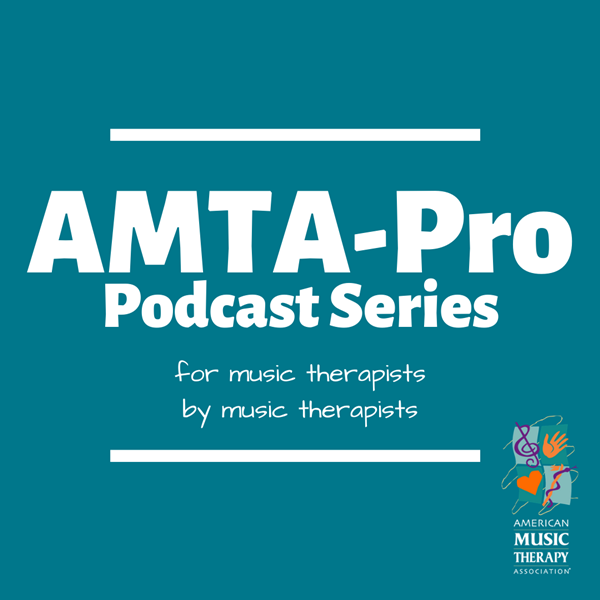
8455 Colesville Road, Suite 1000 | Silver Spring MD 20910 | Phone: 301.589.3300 | Fax: 301.589.5175